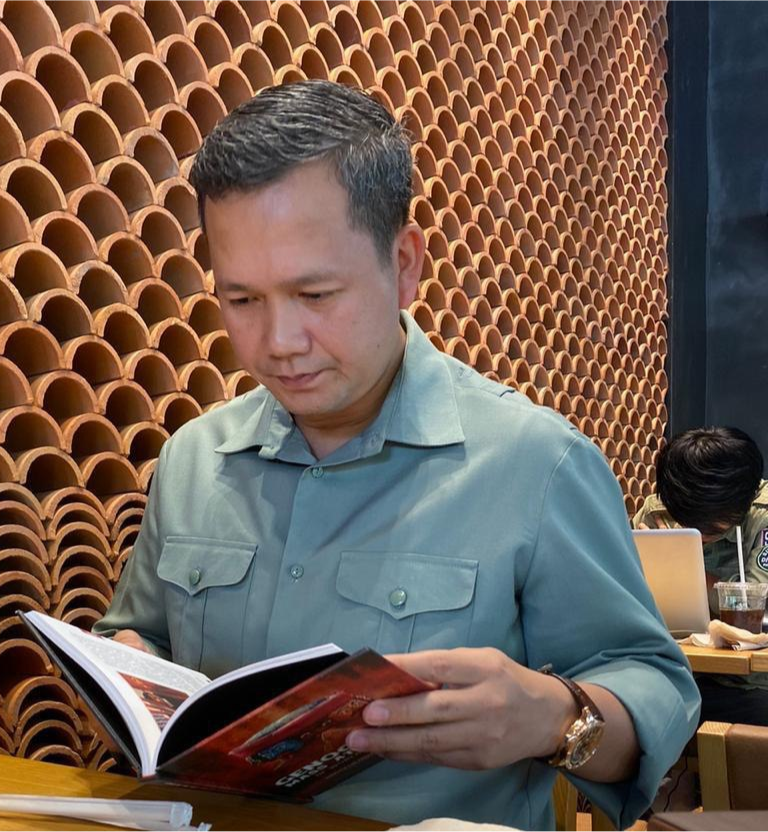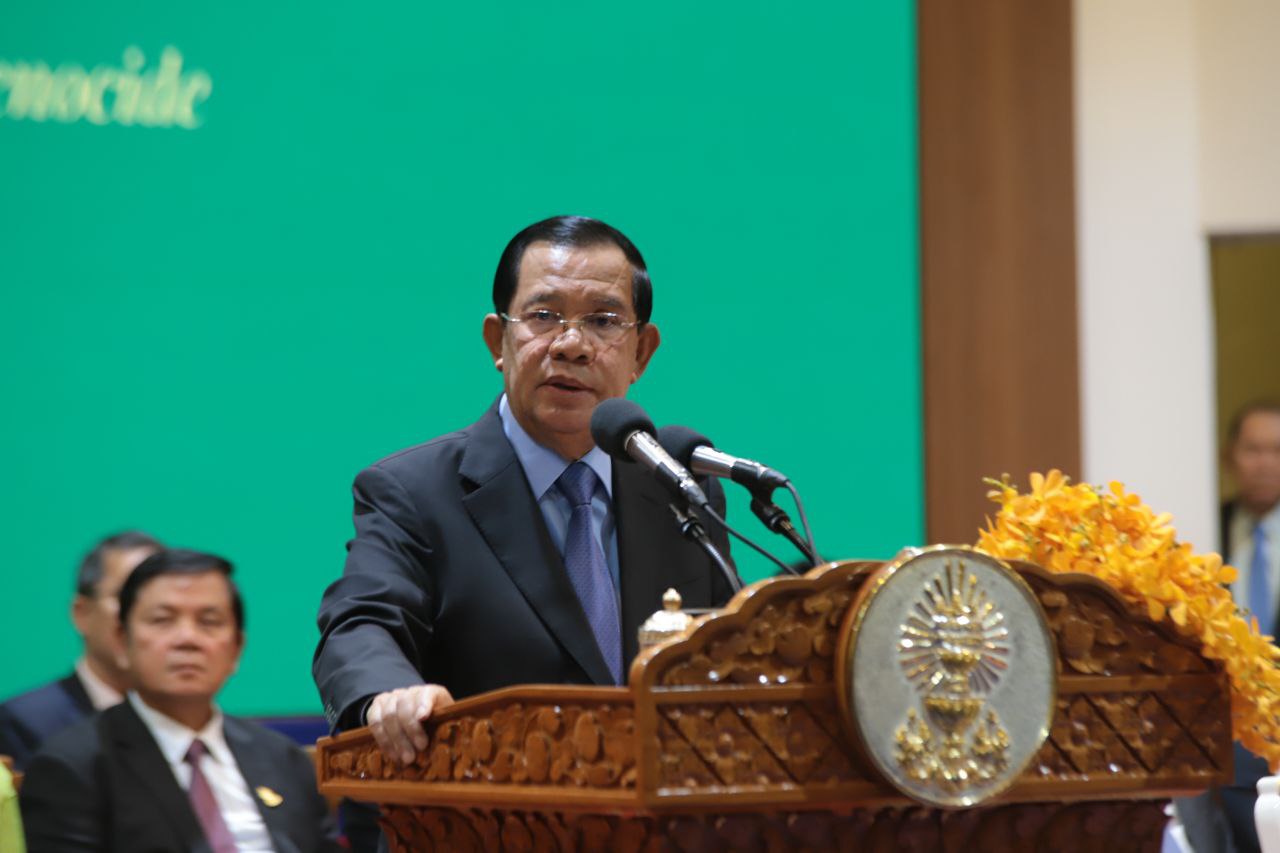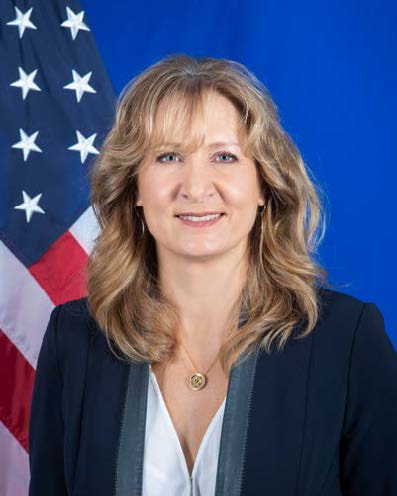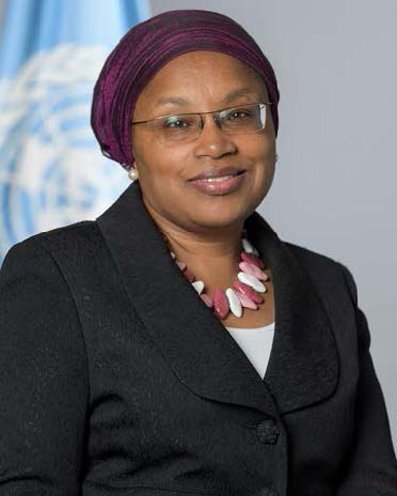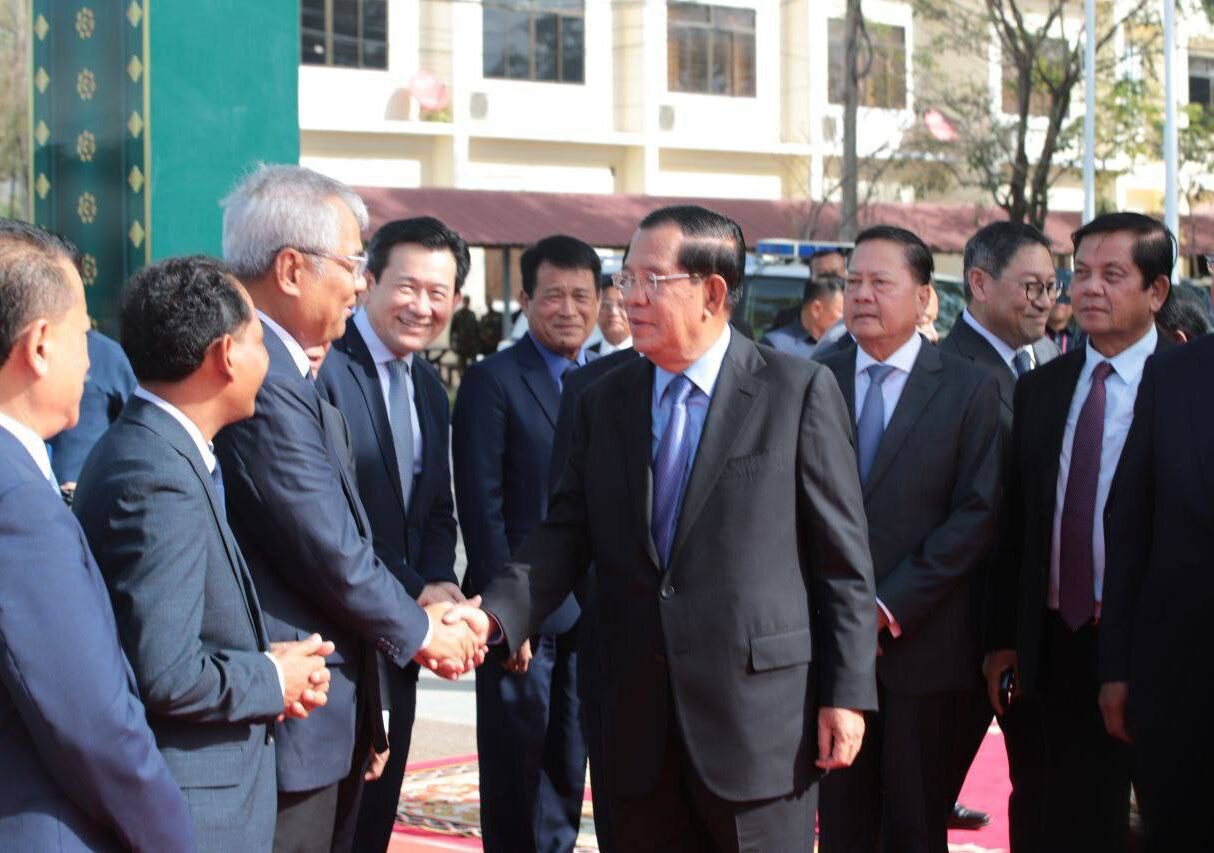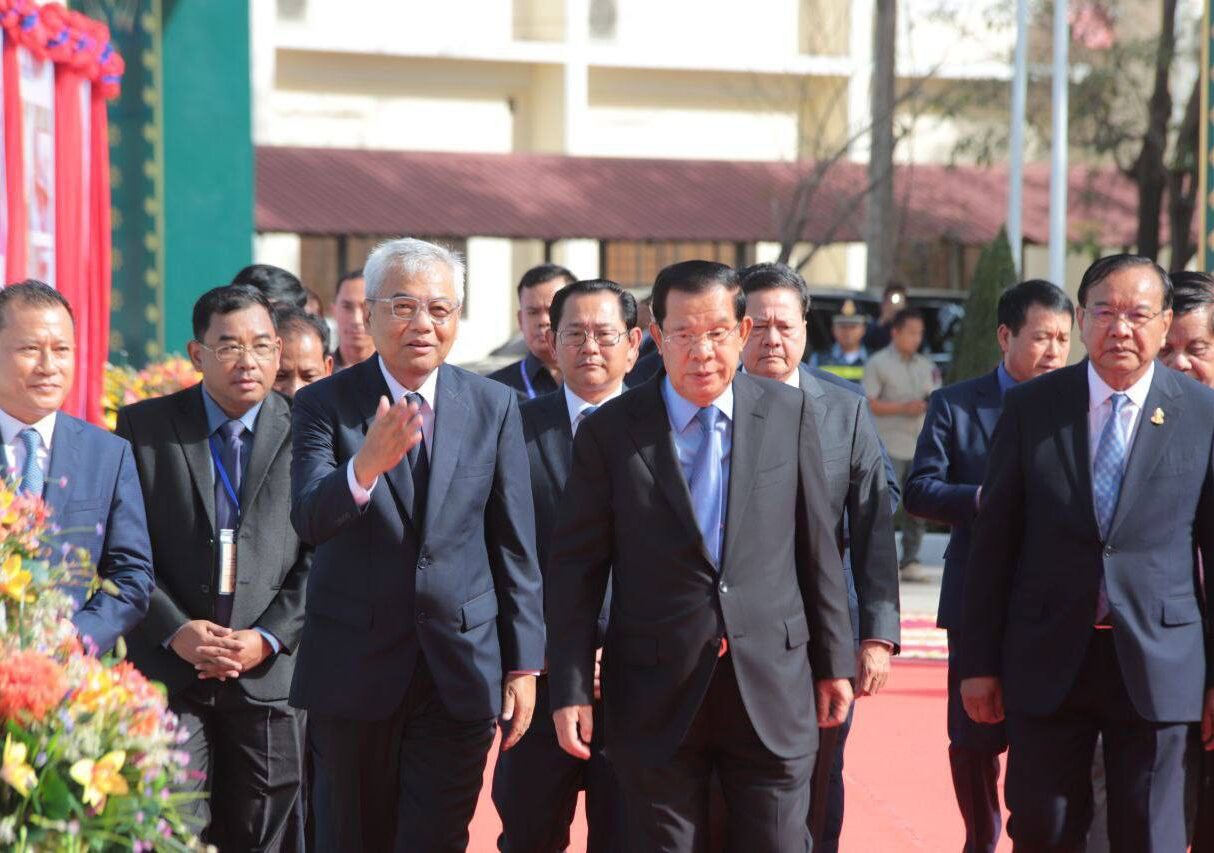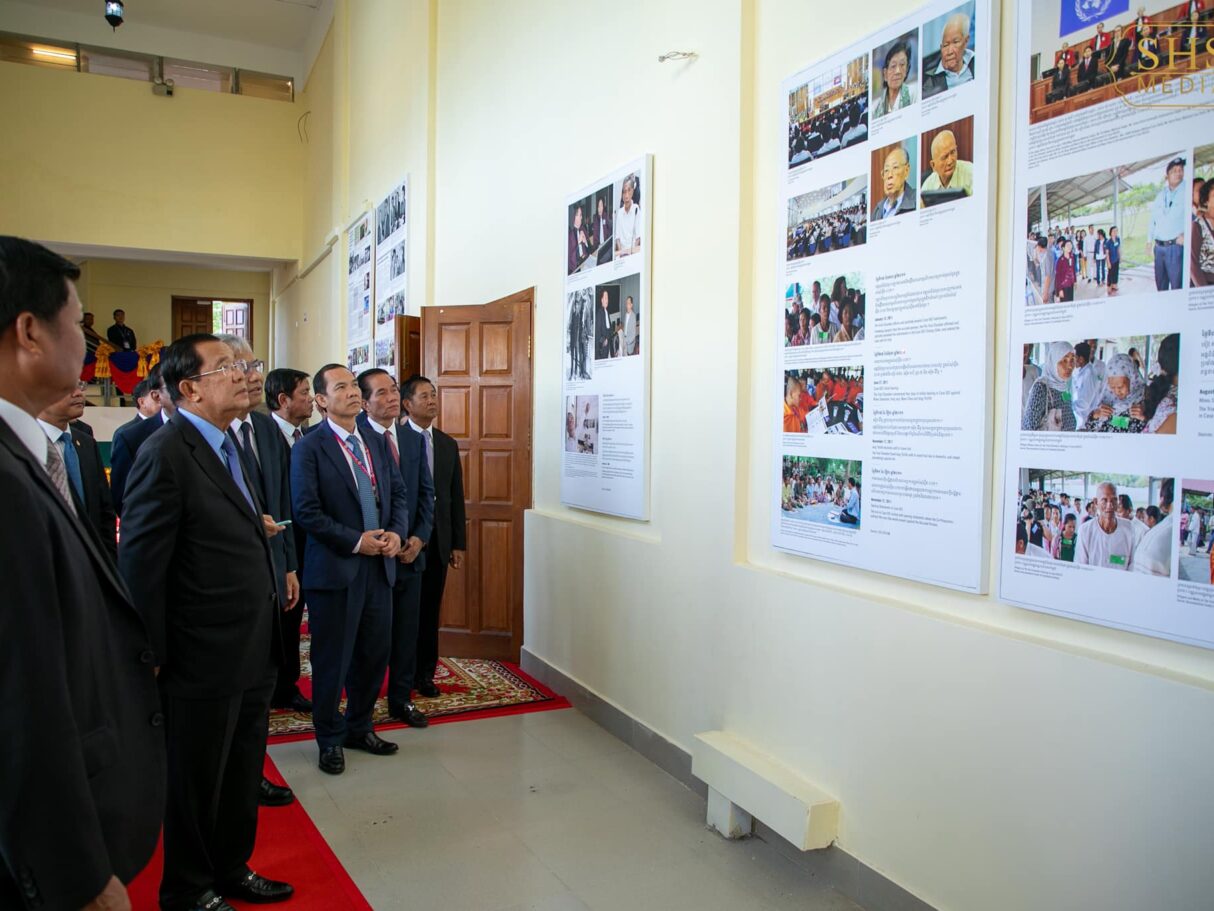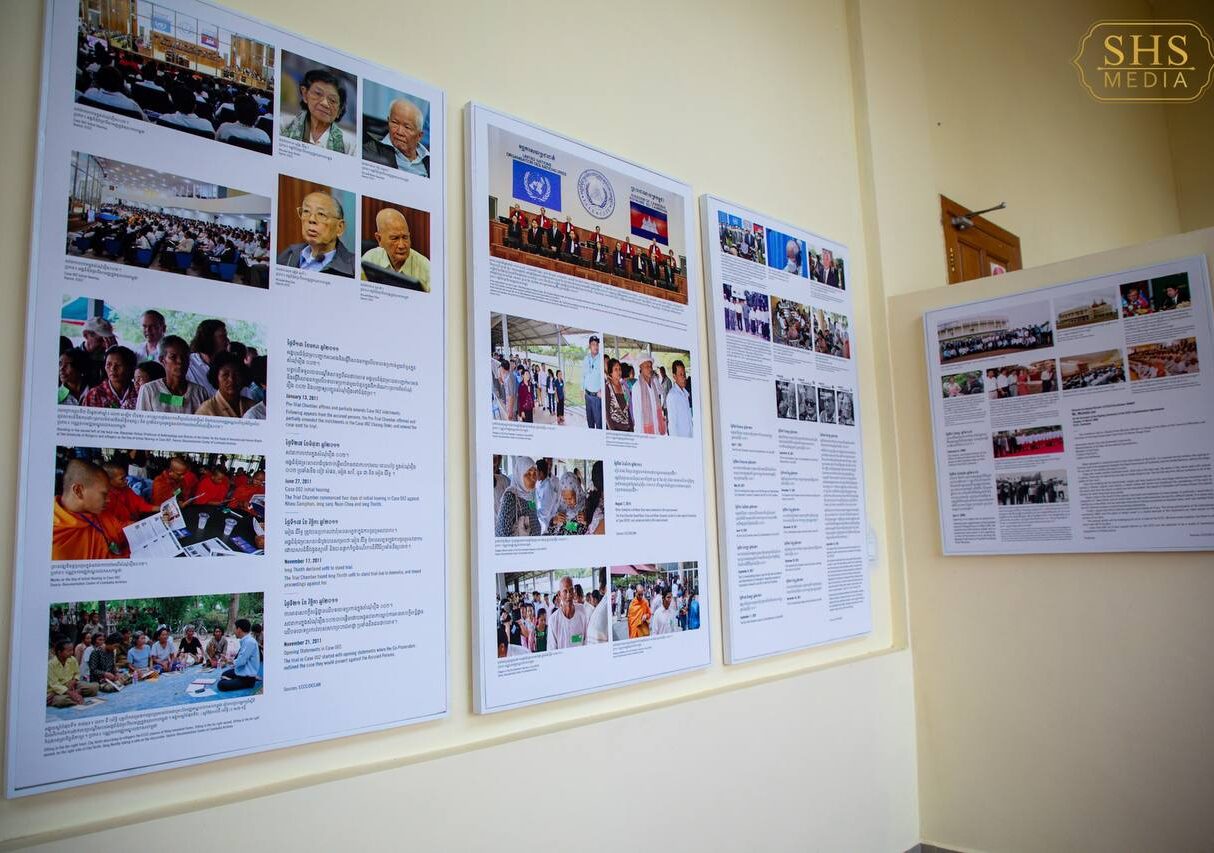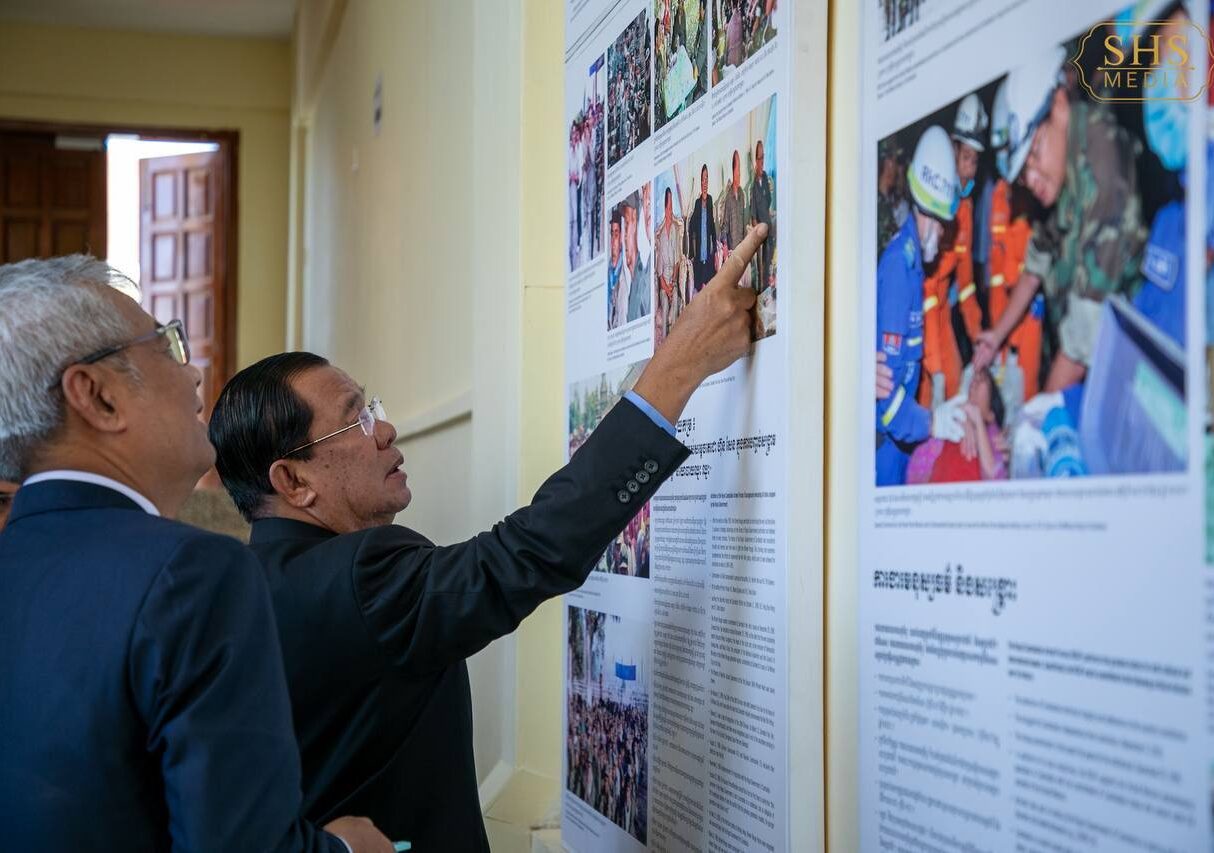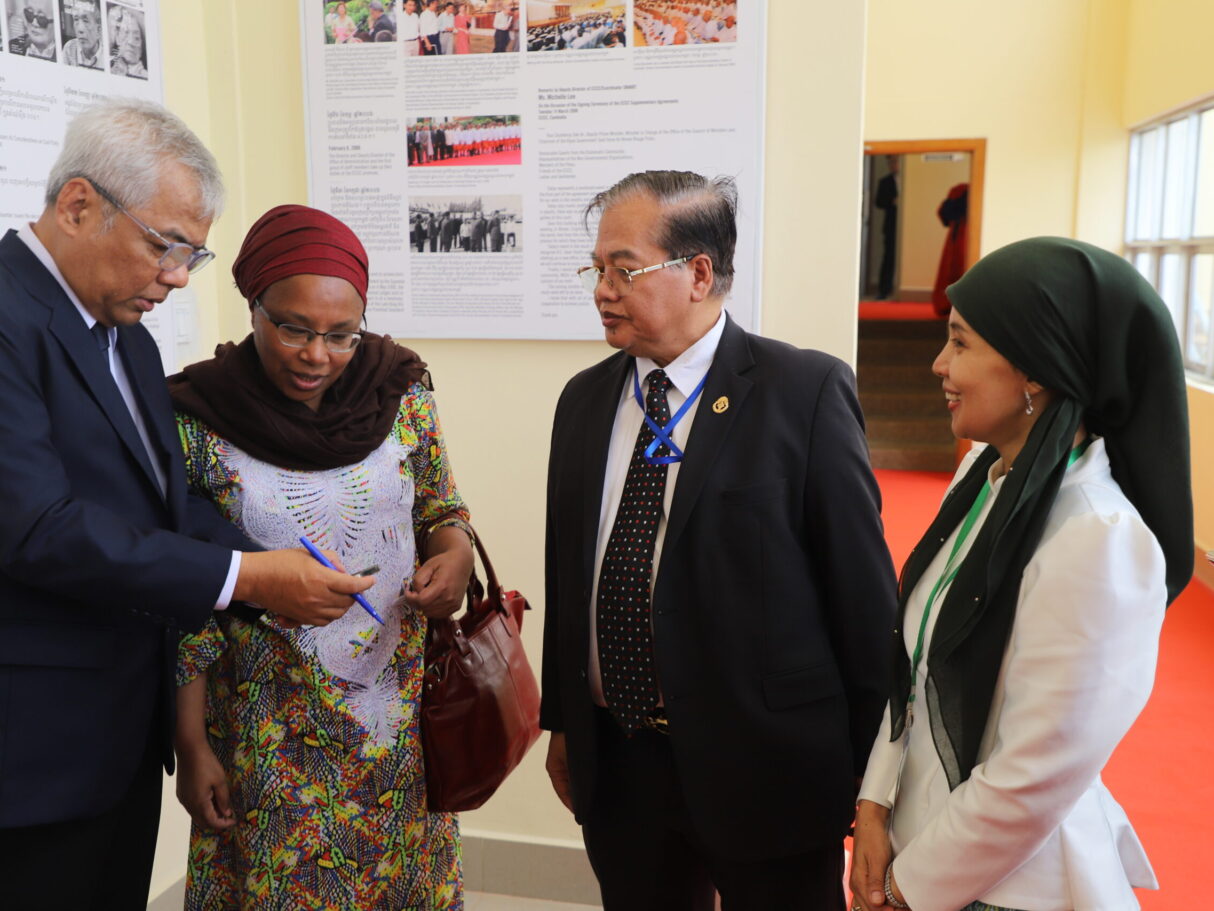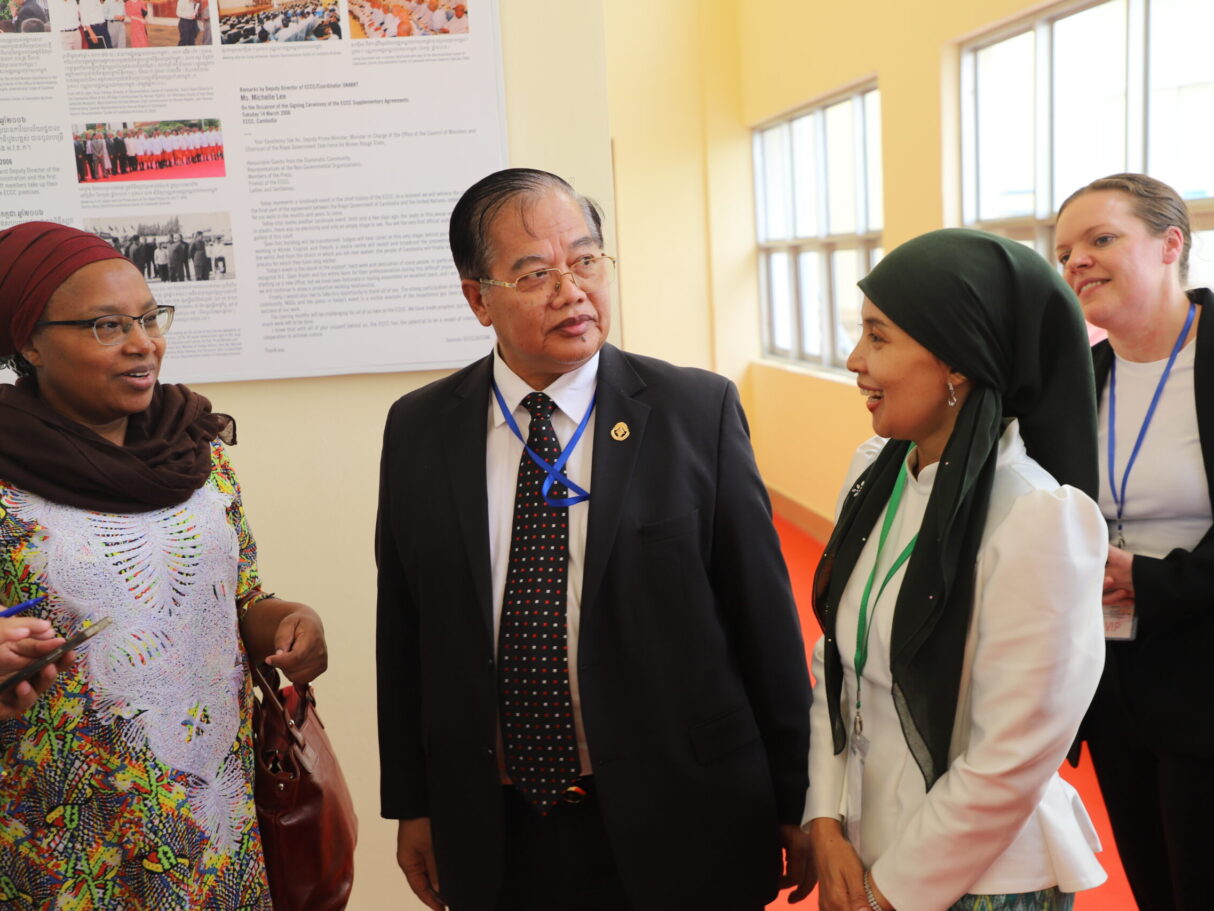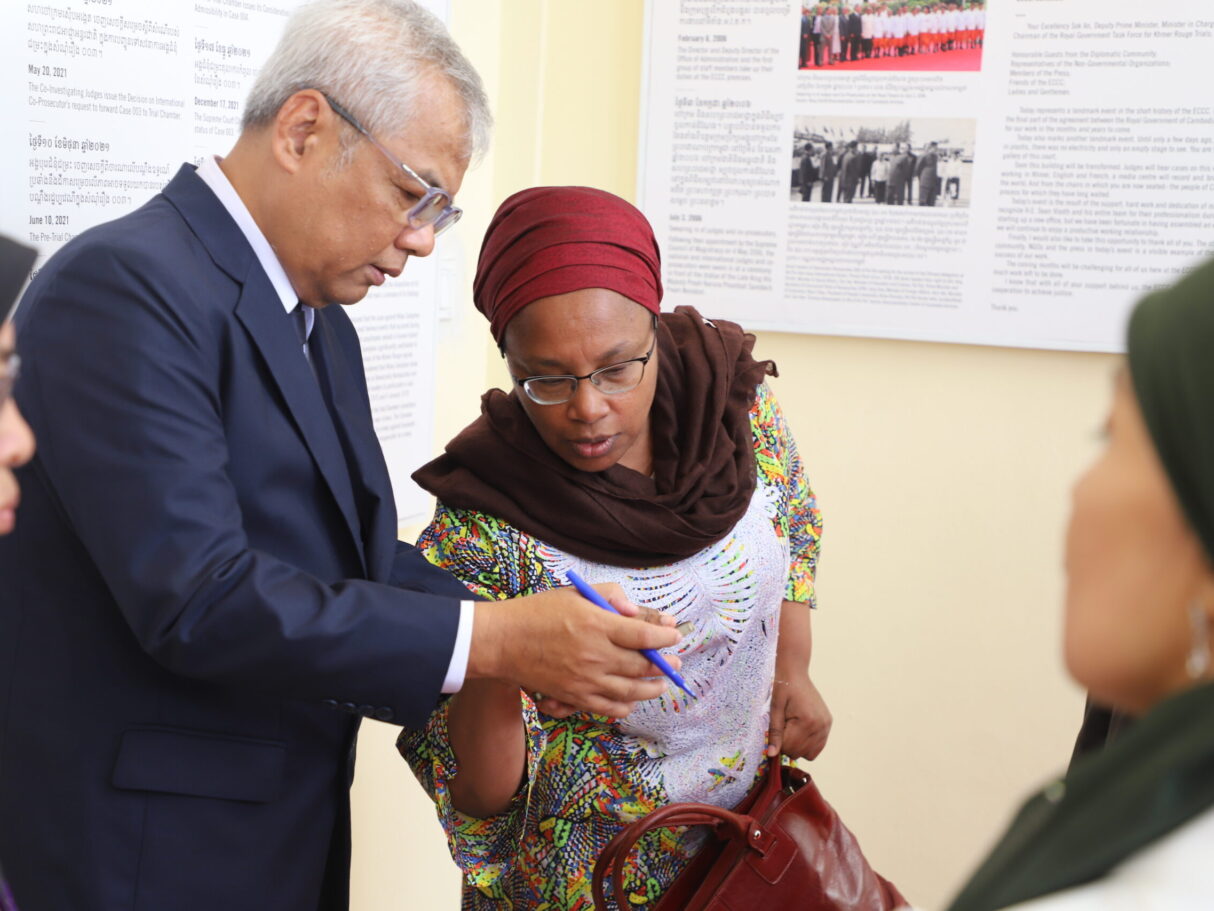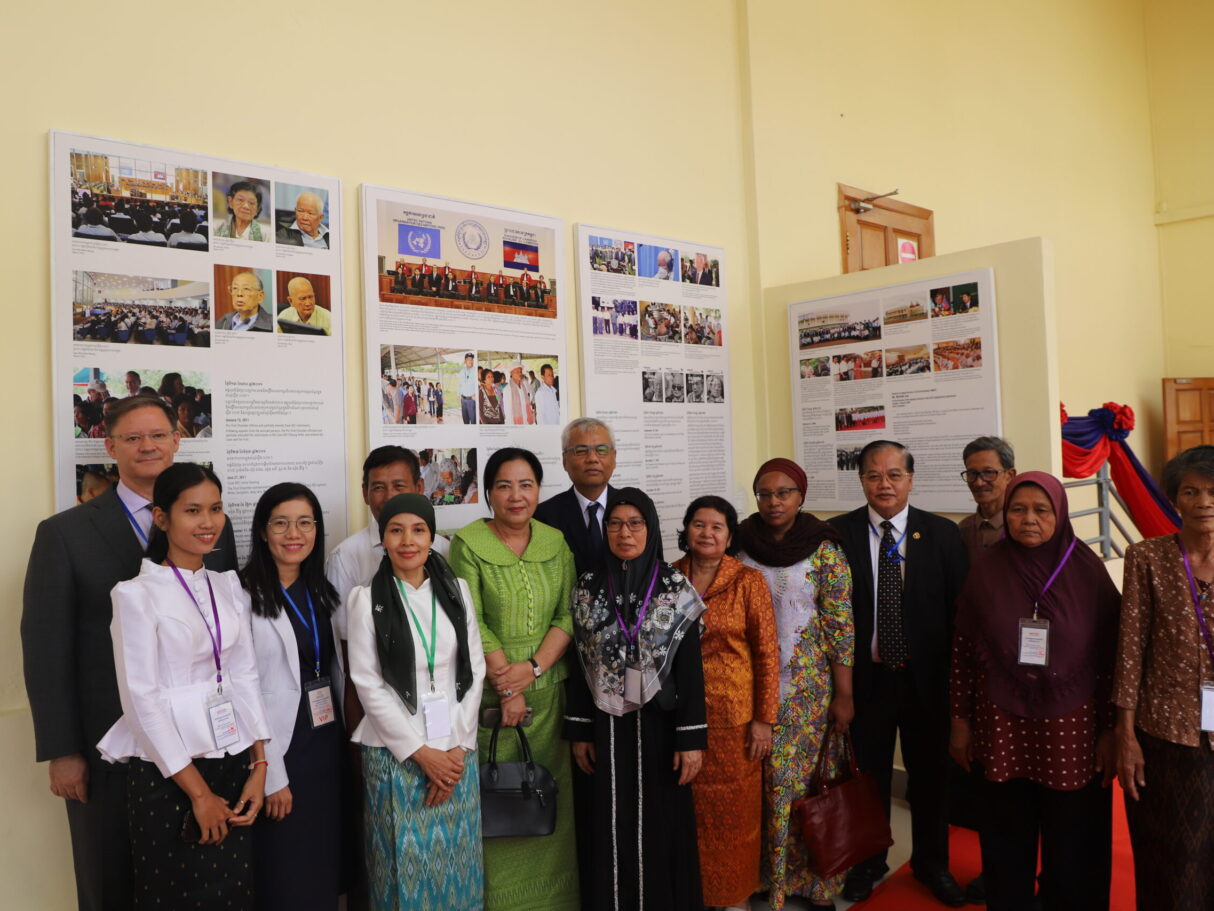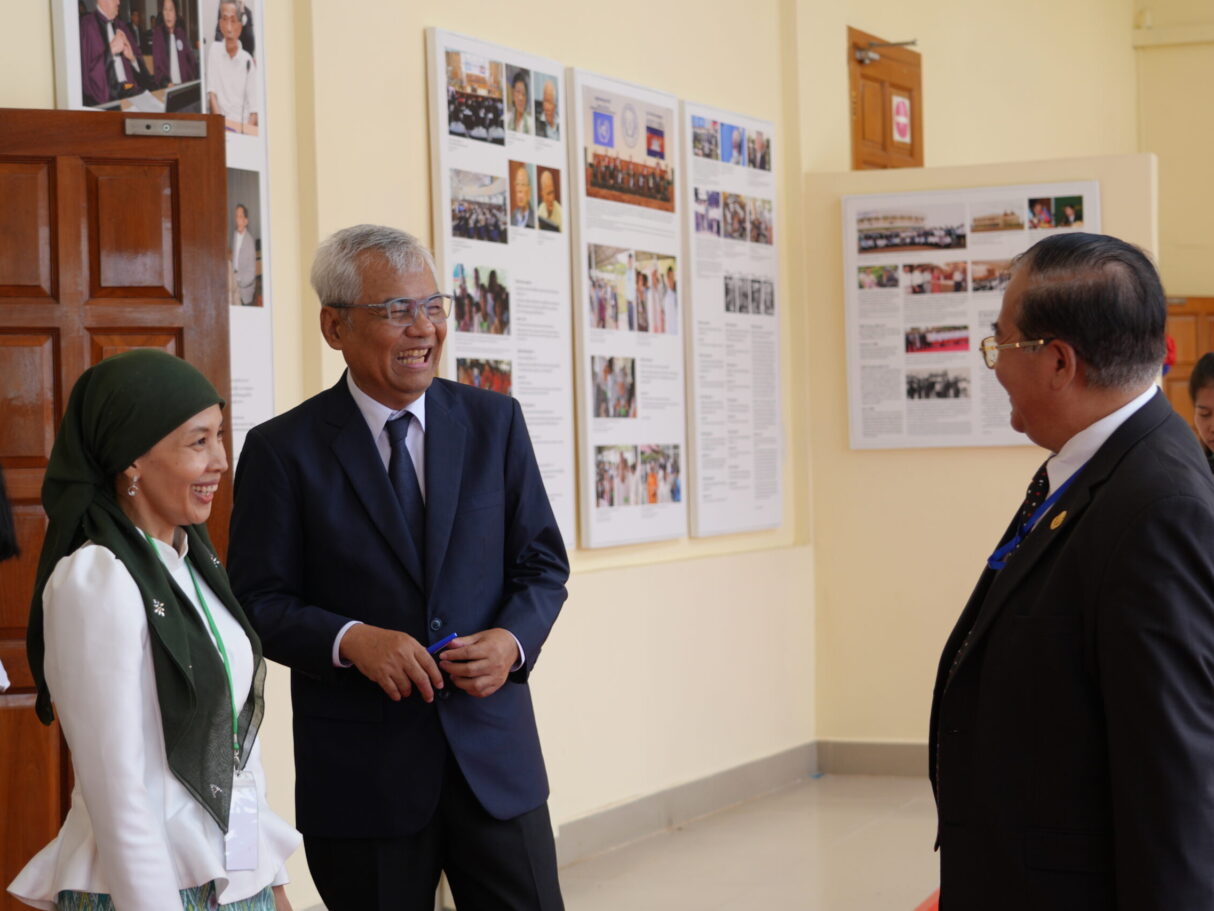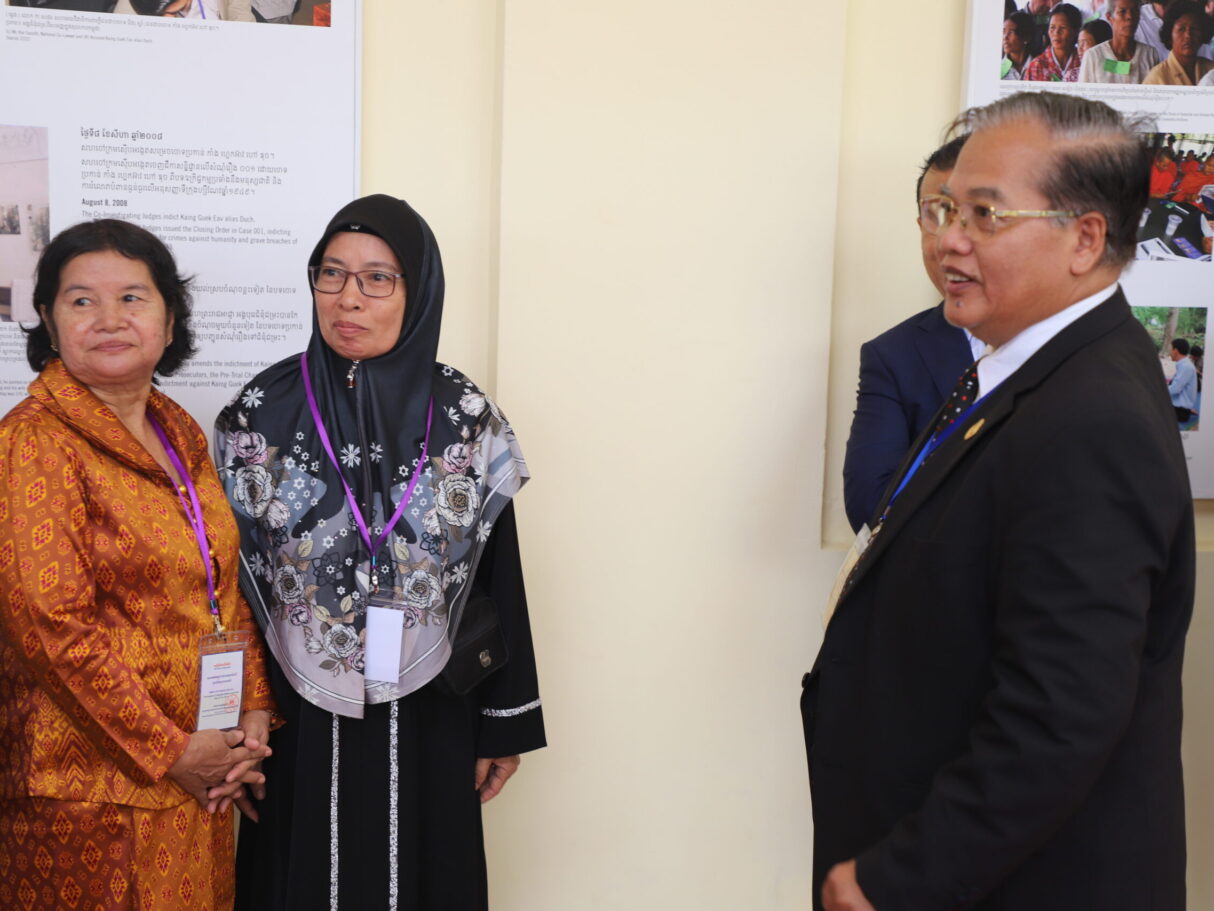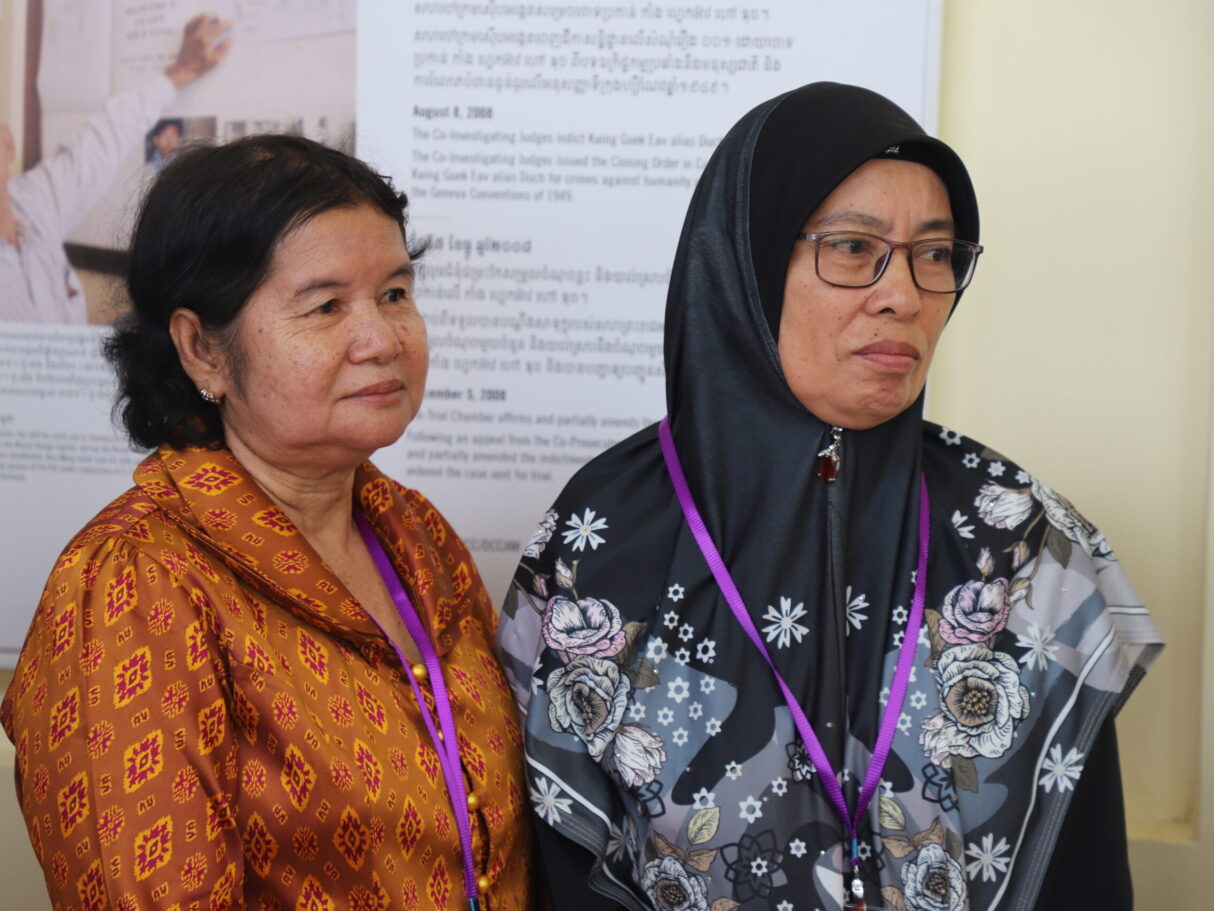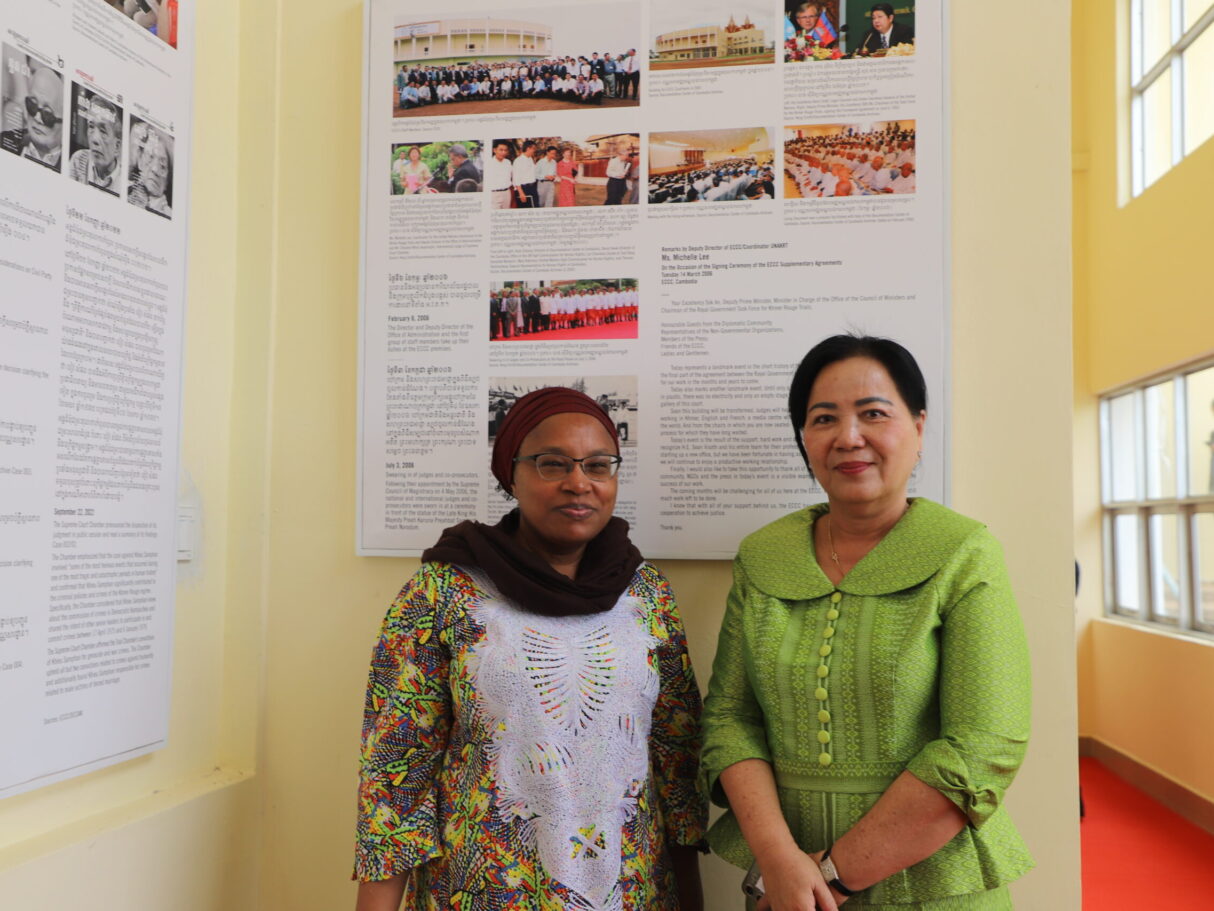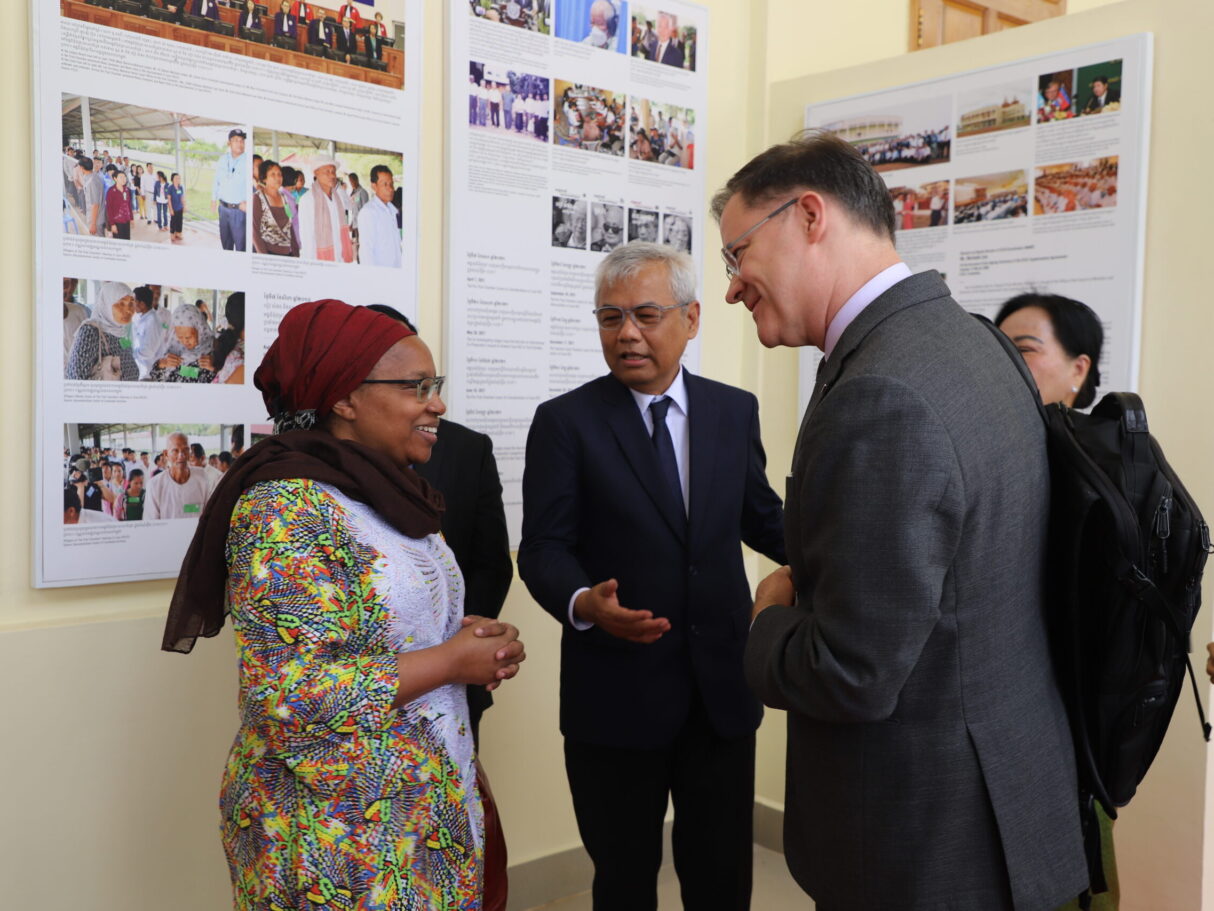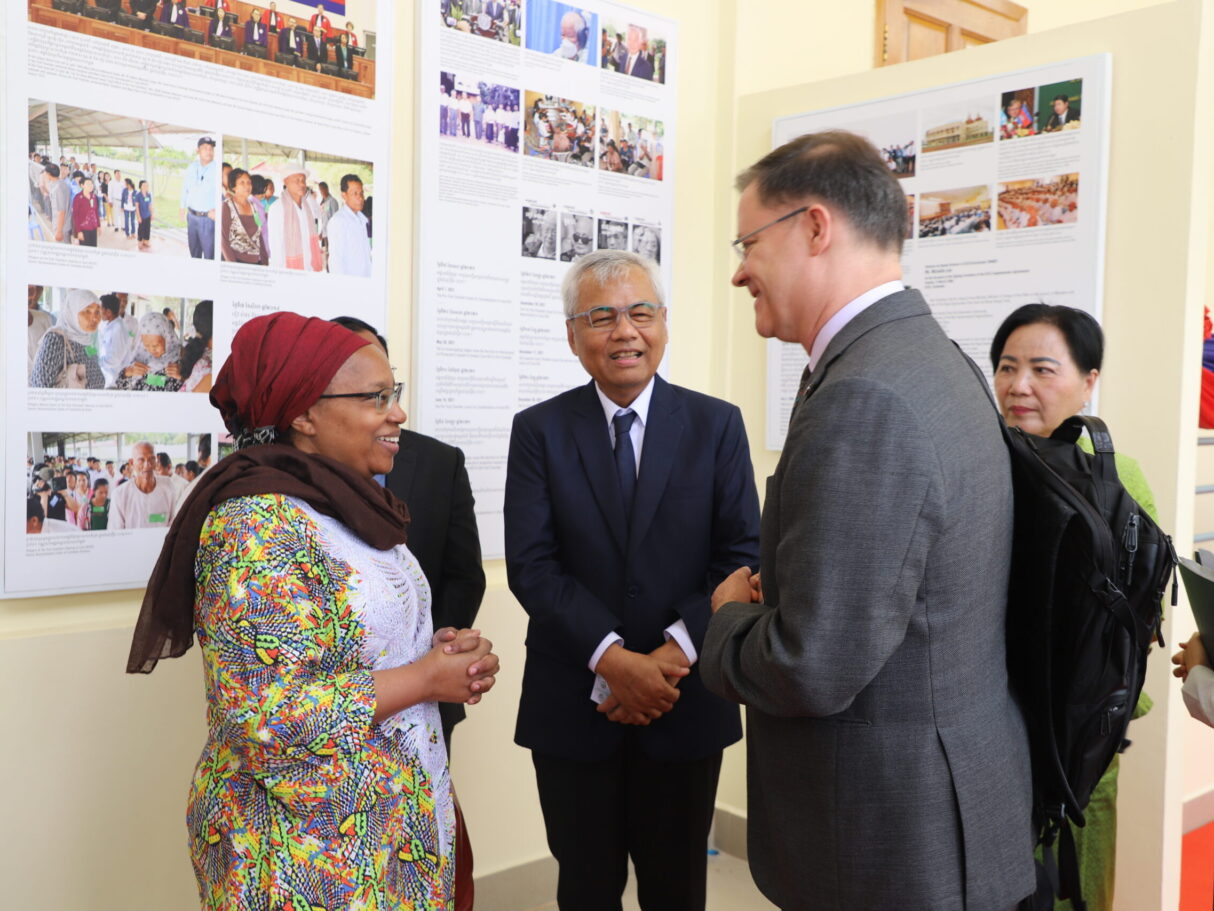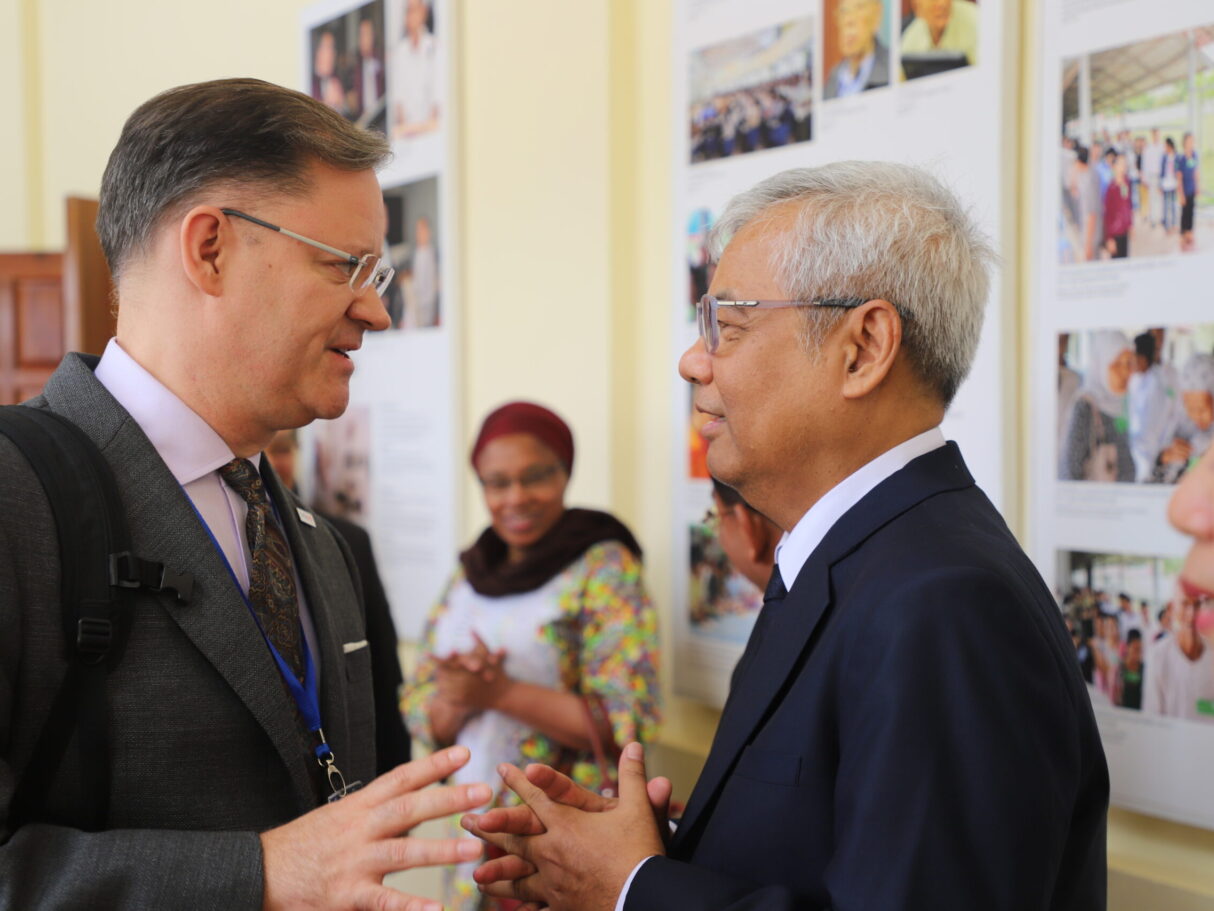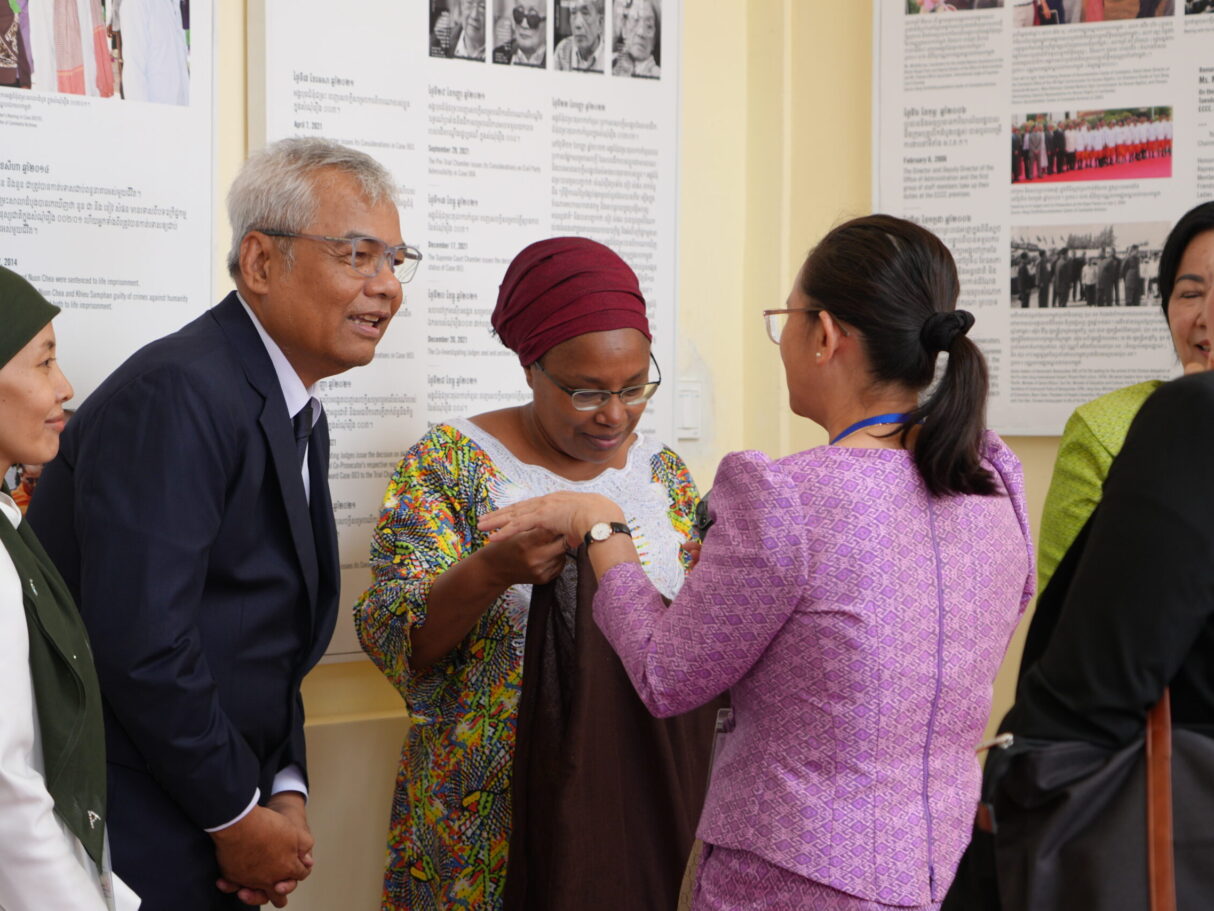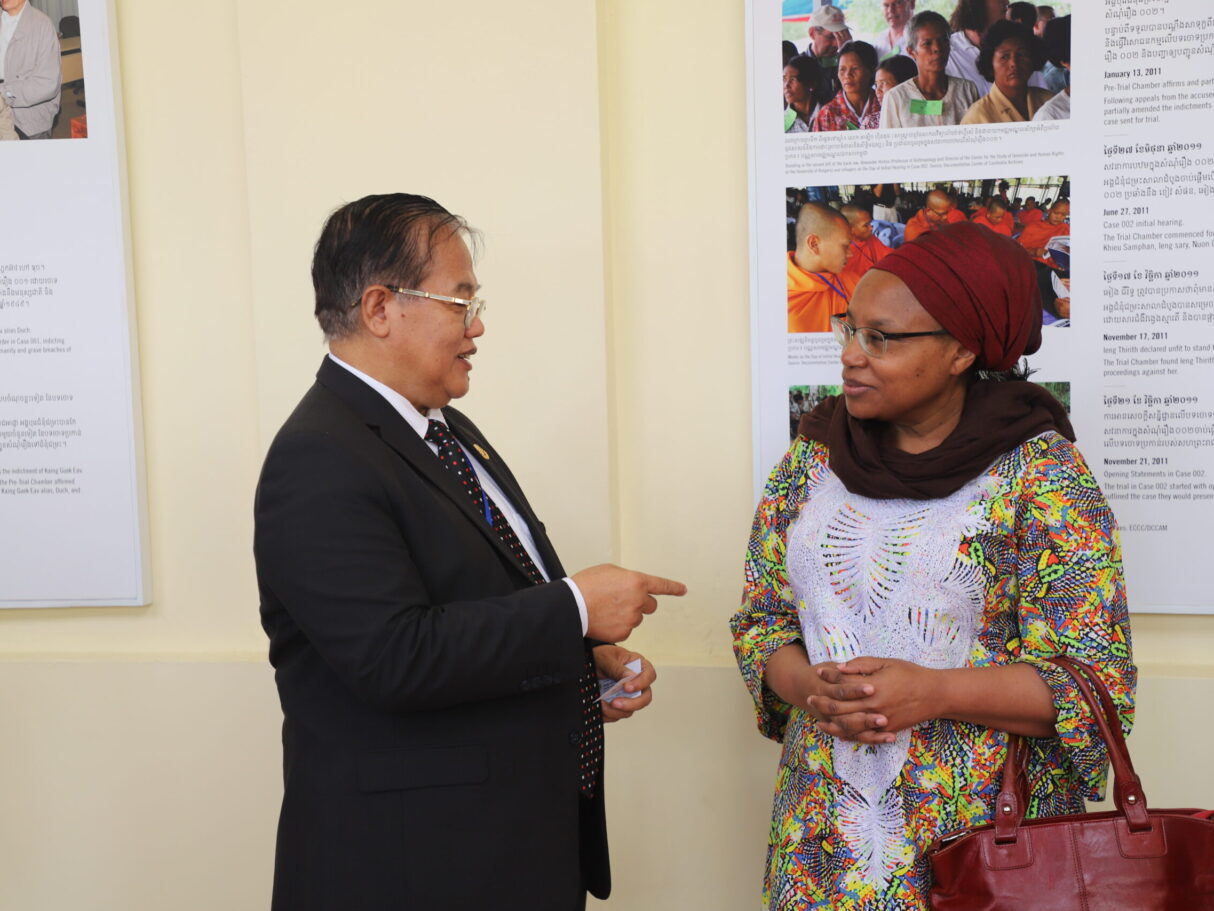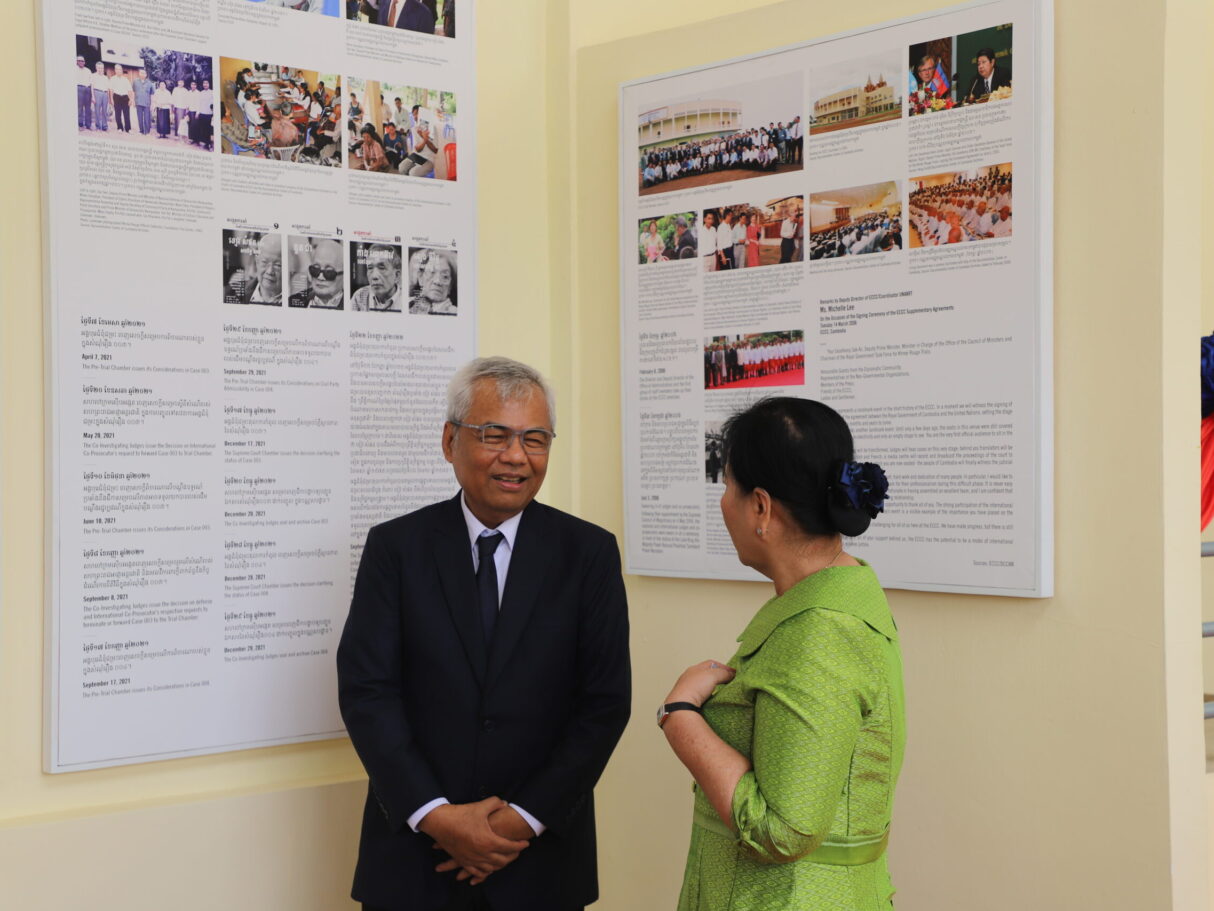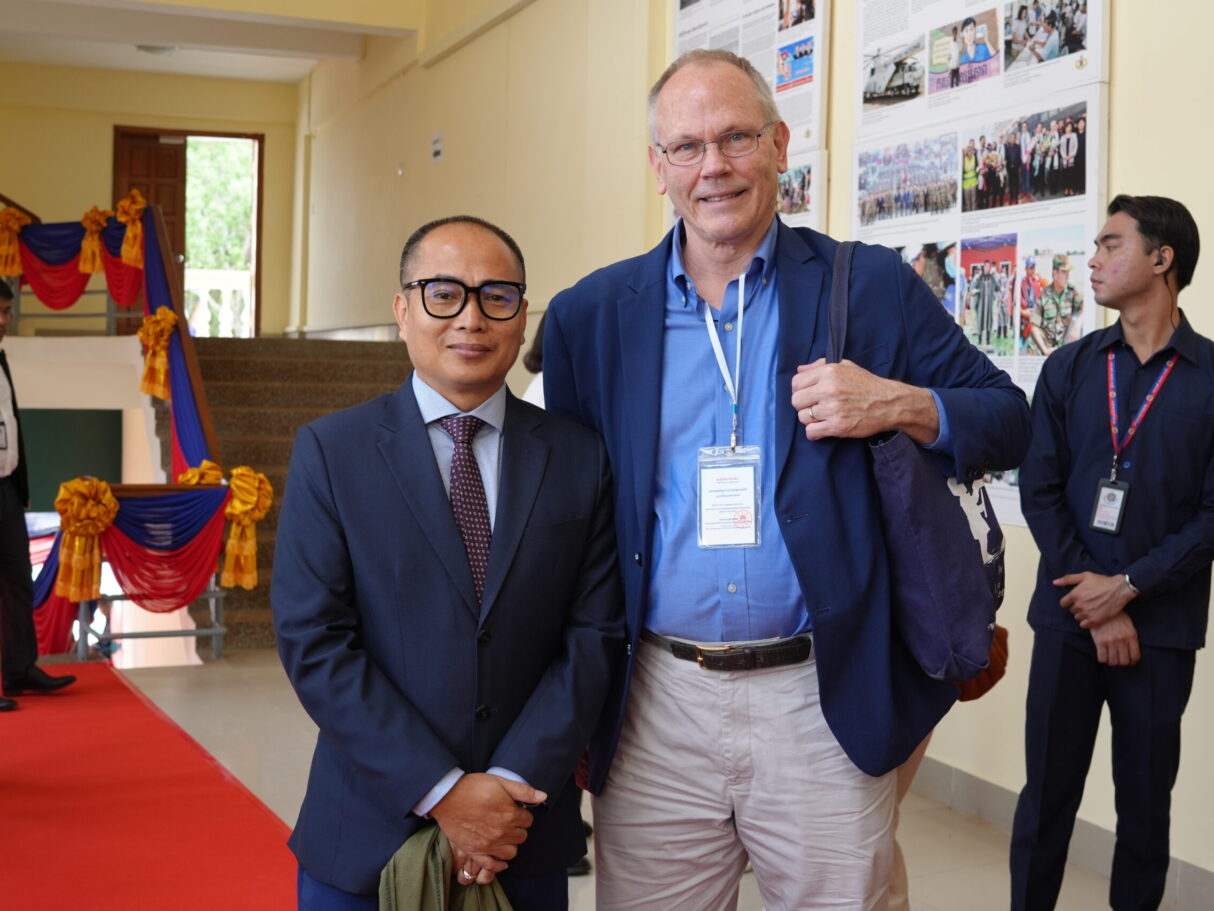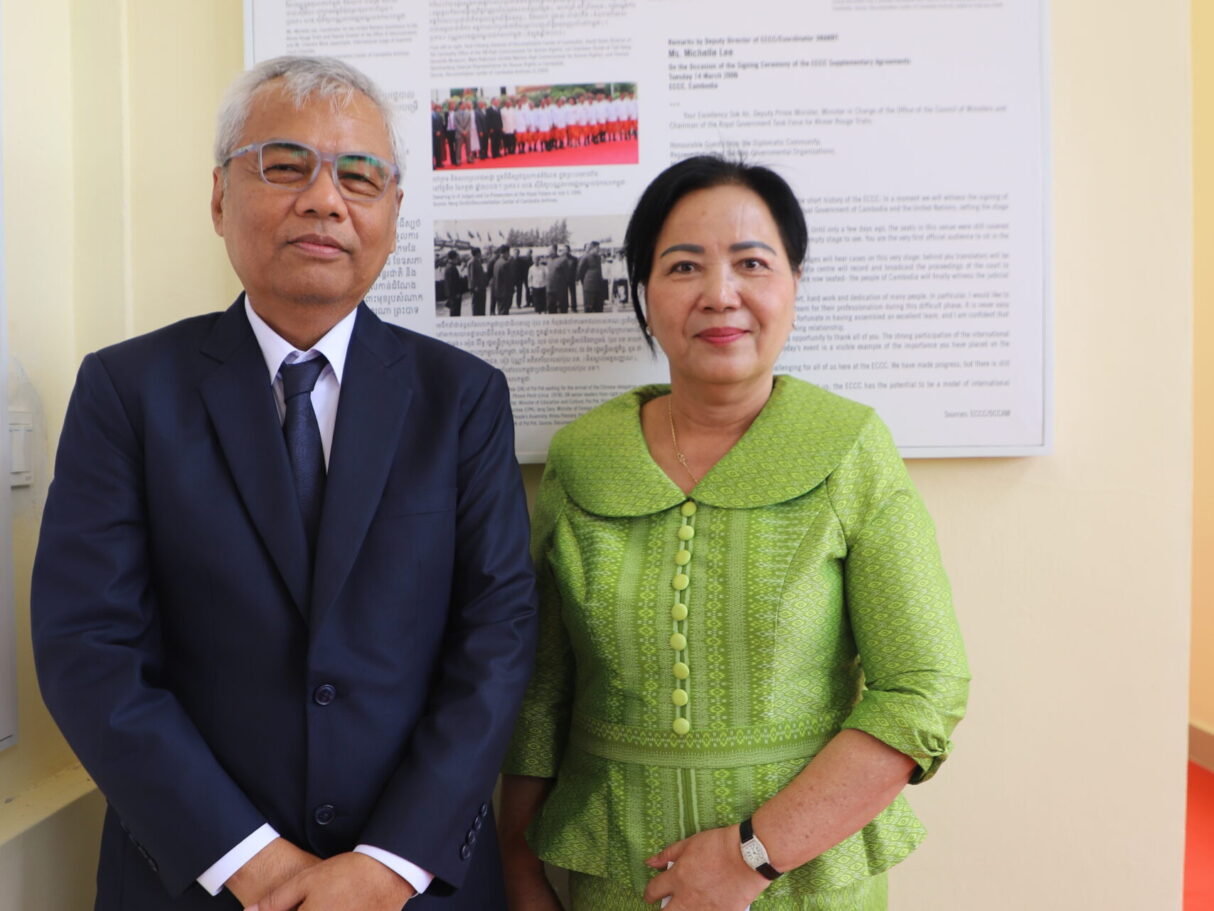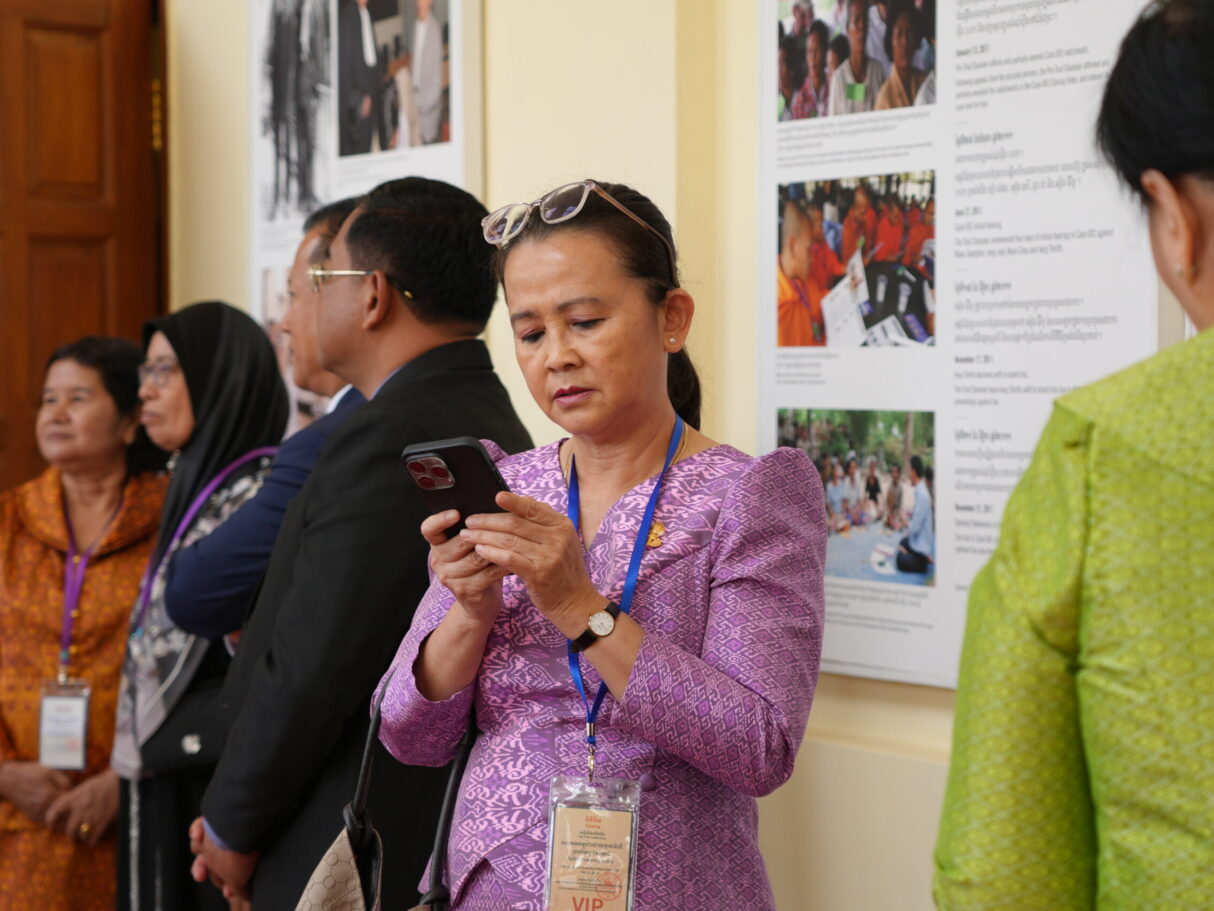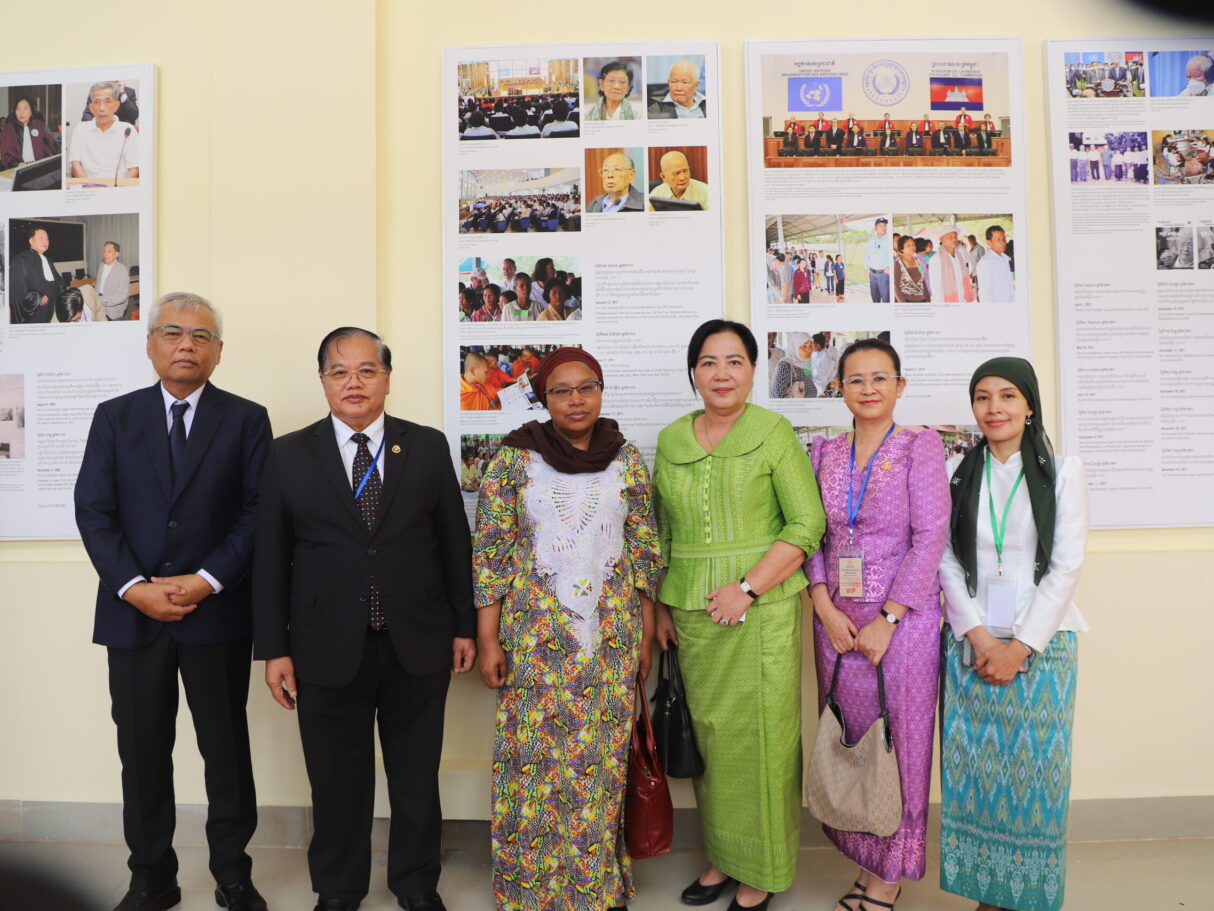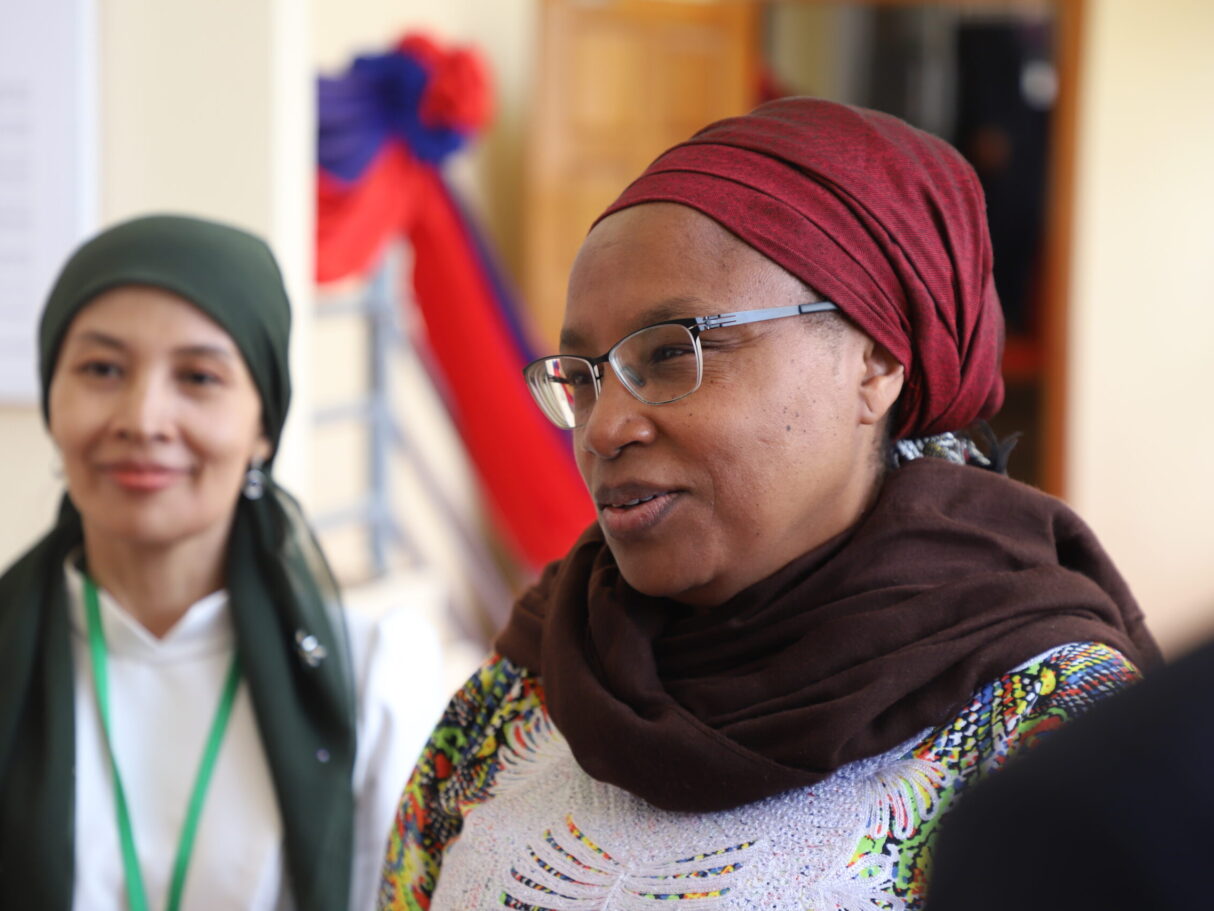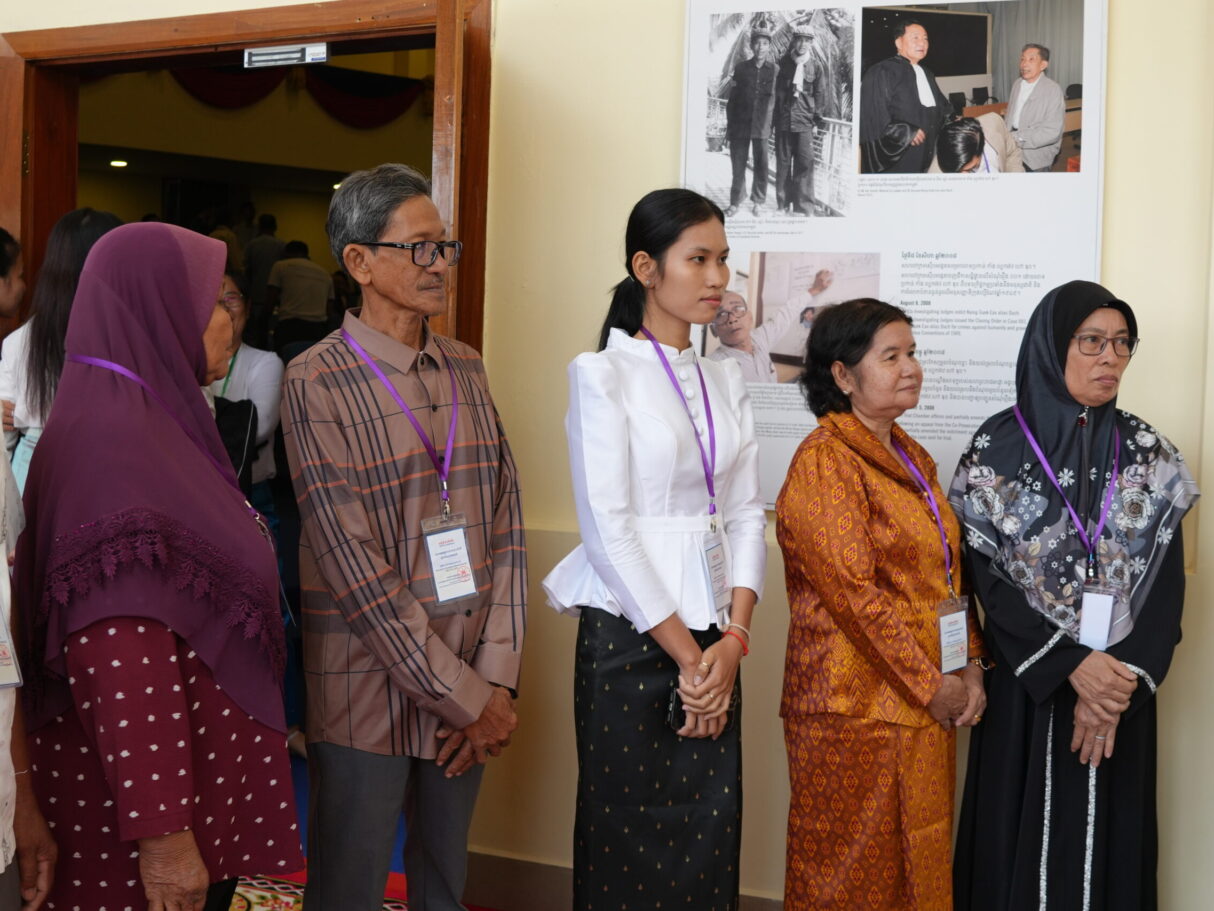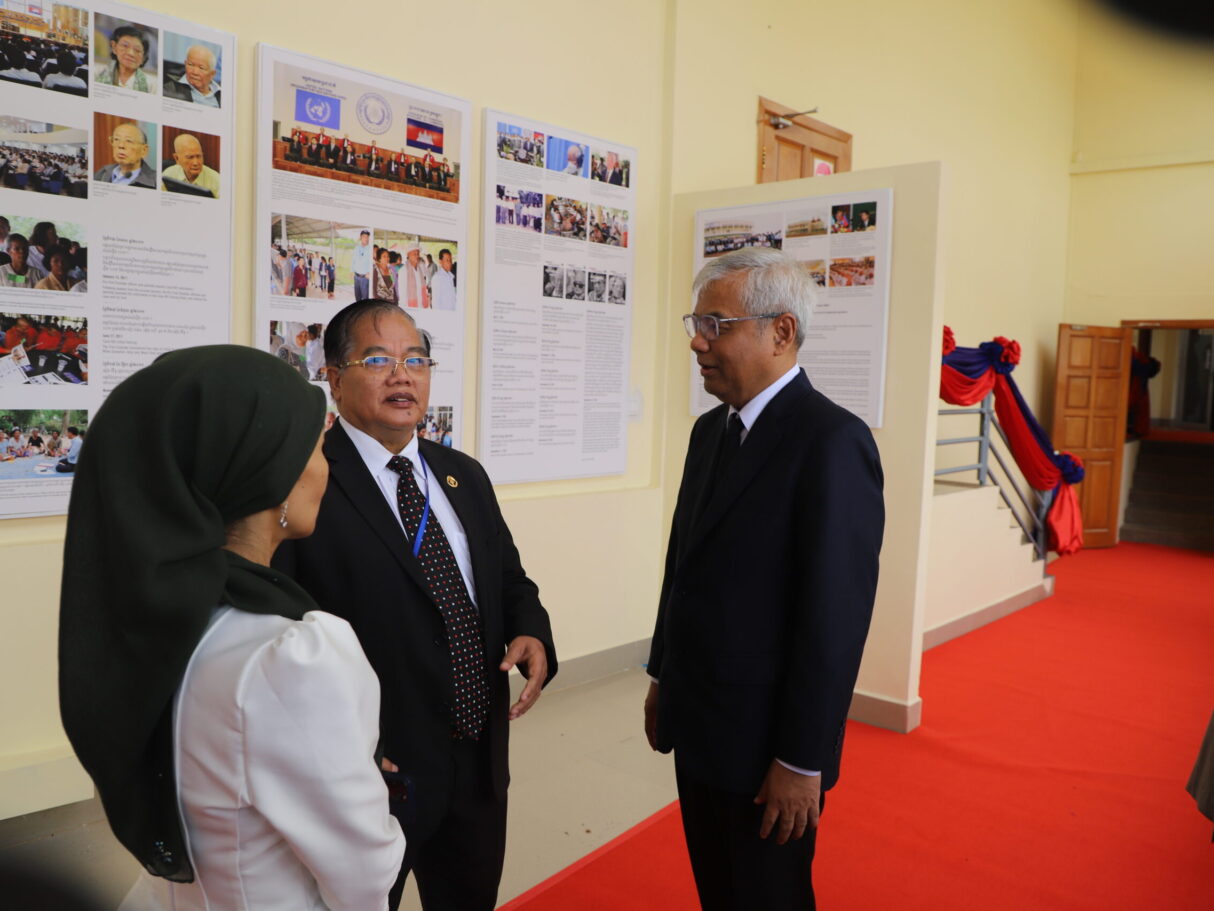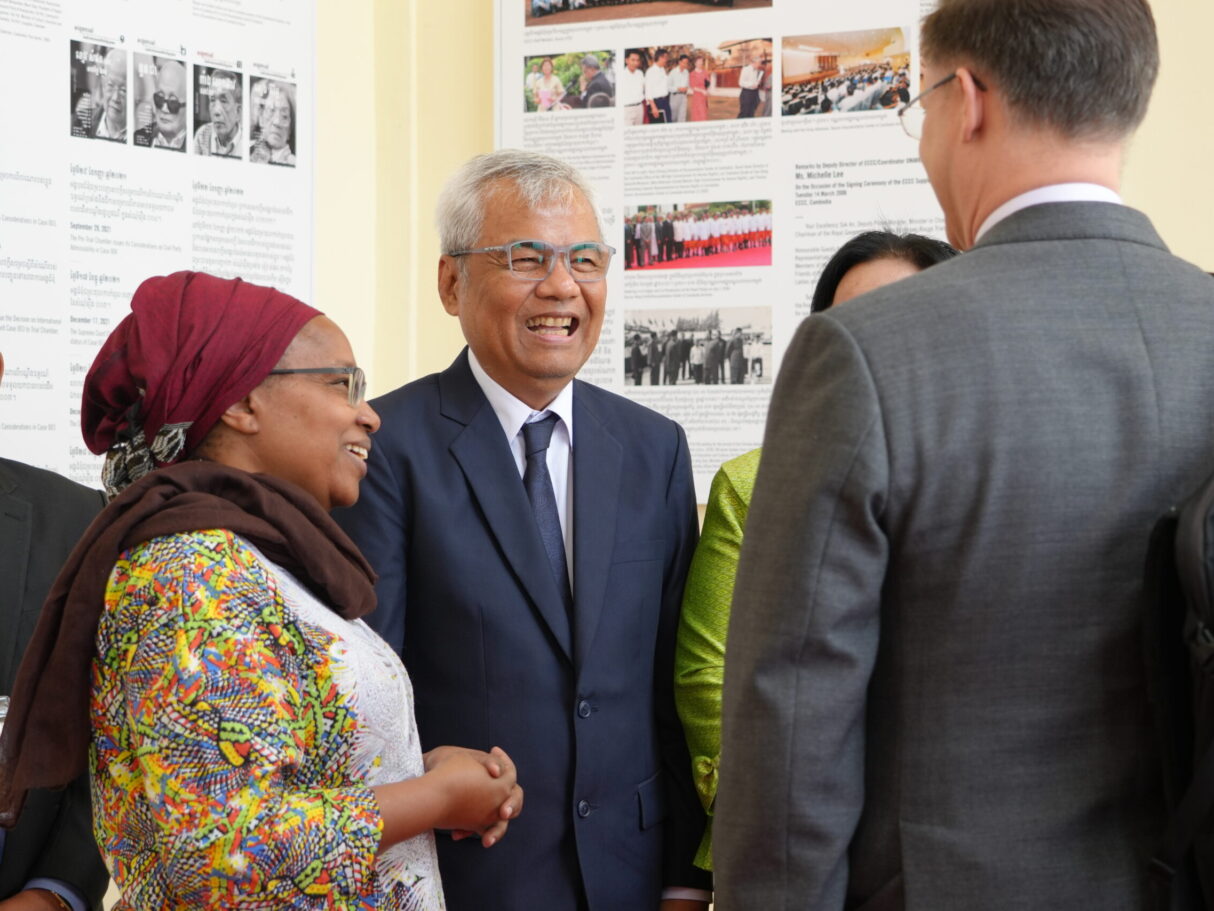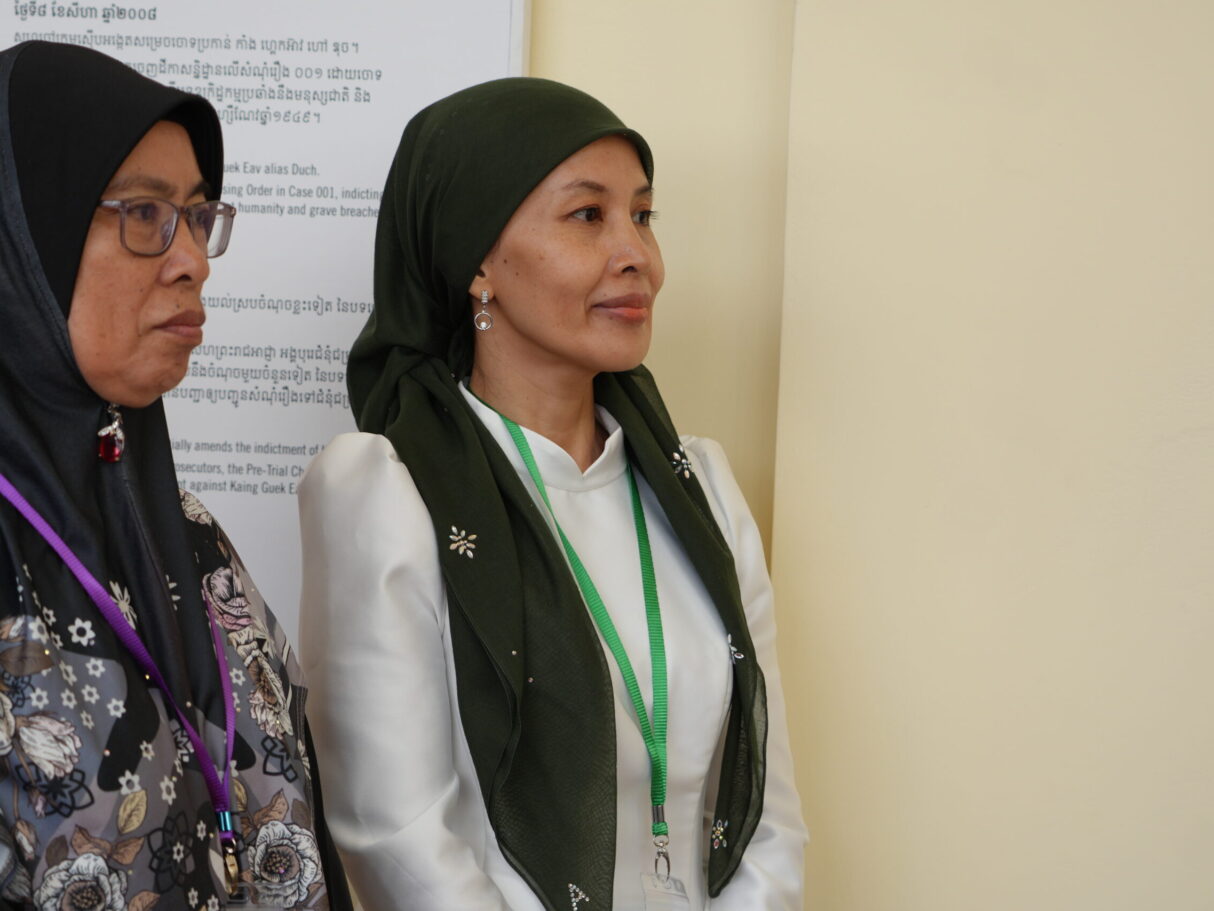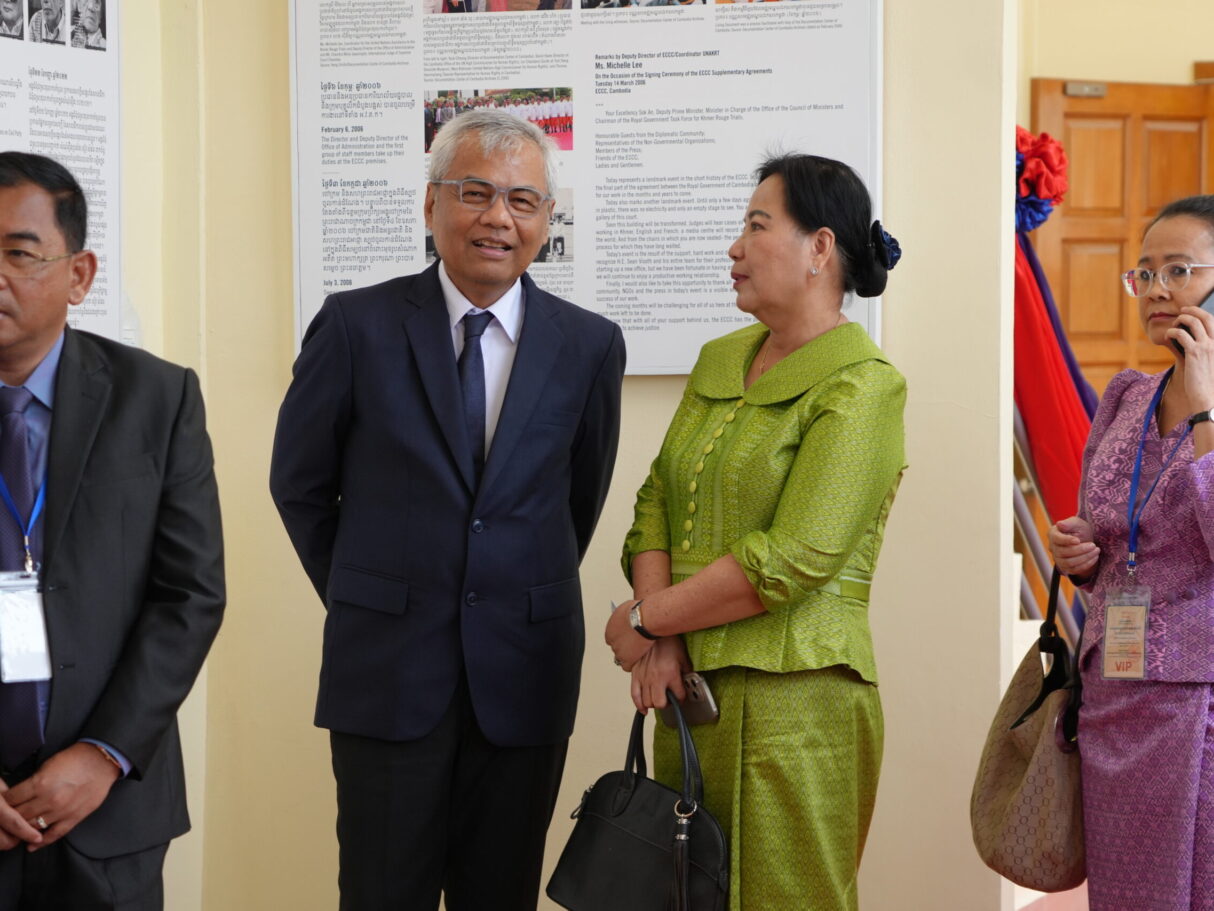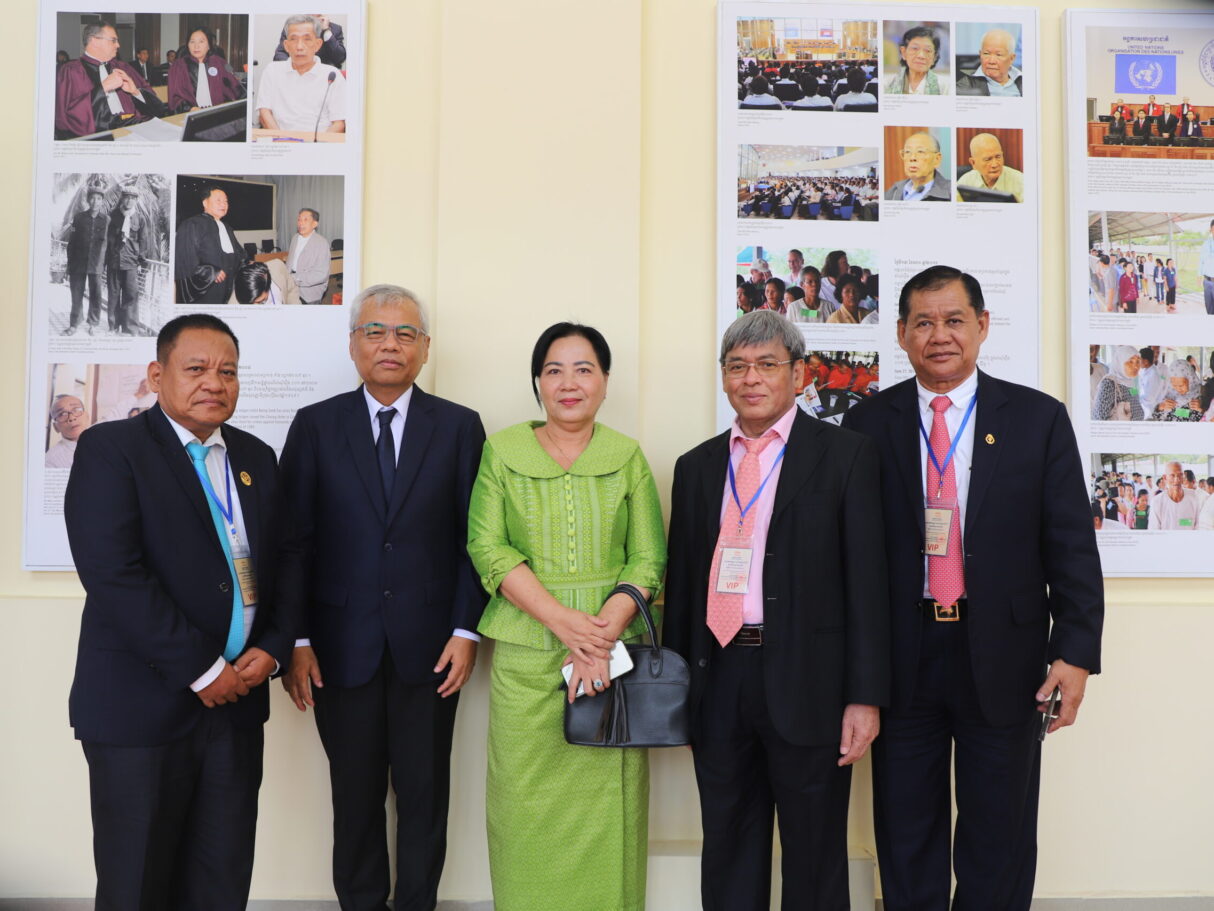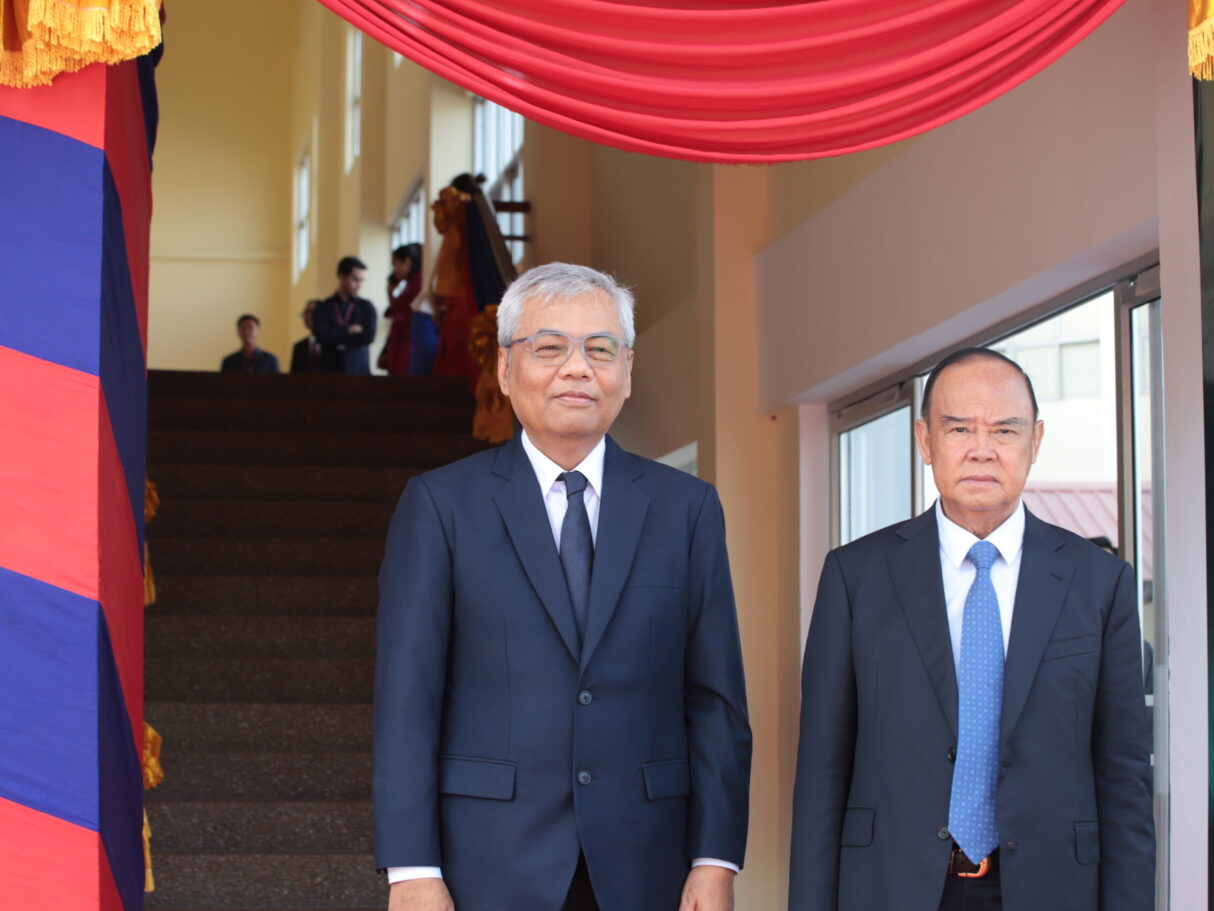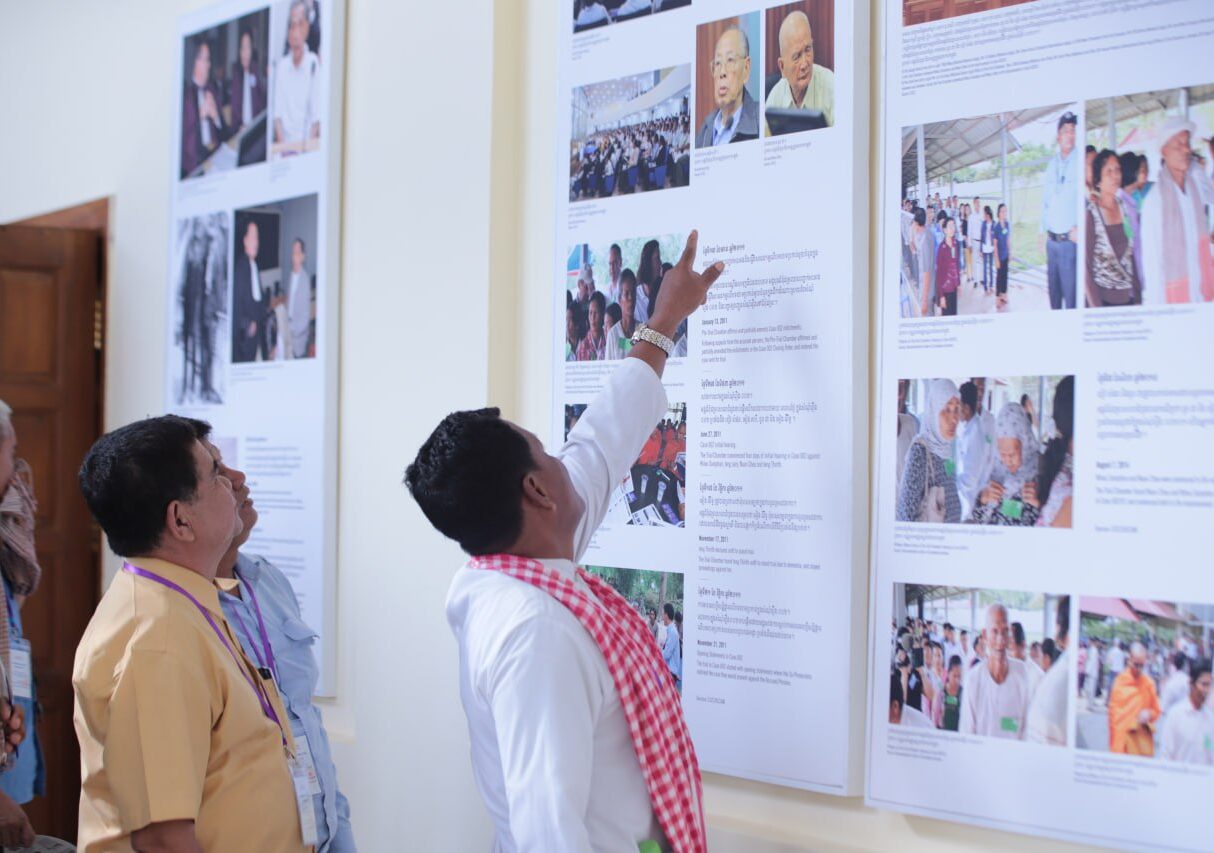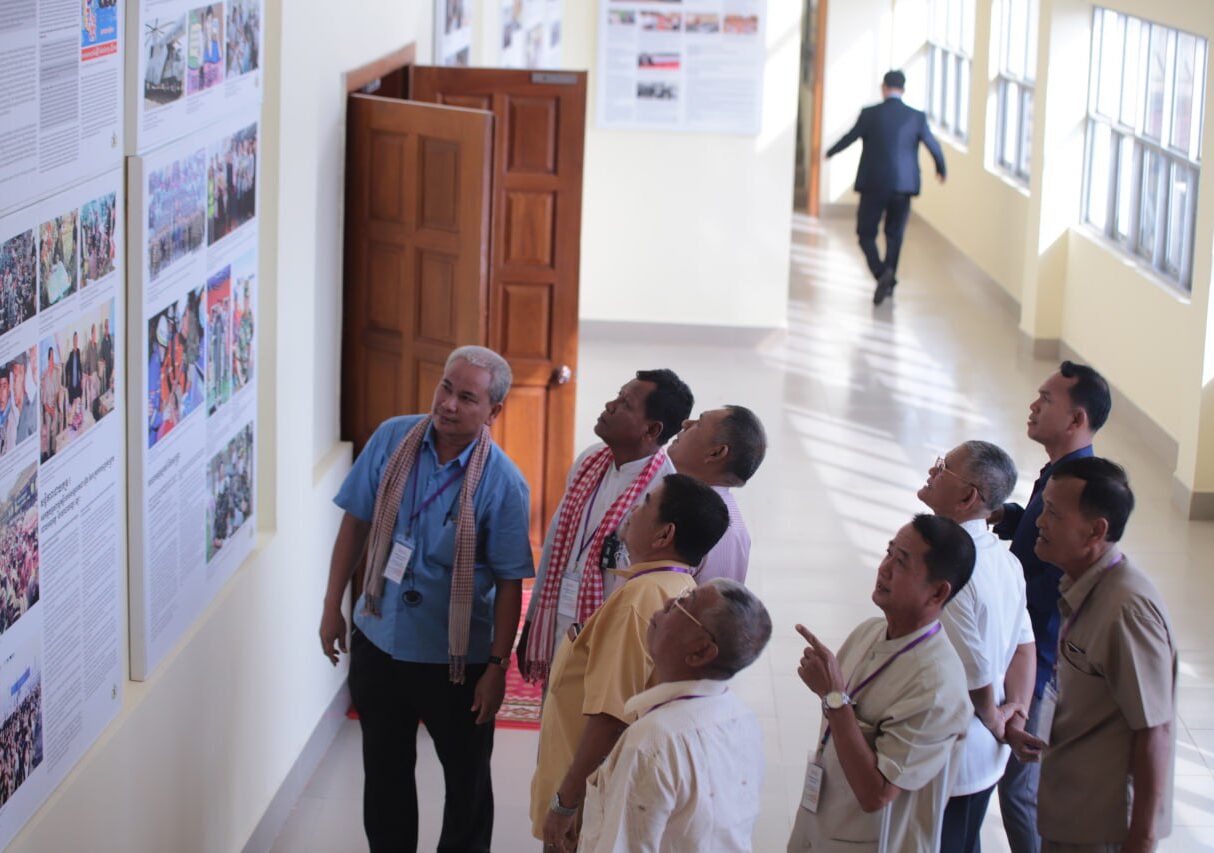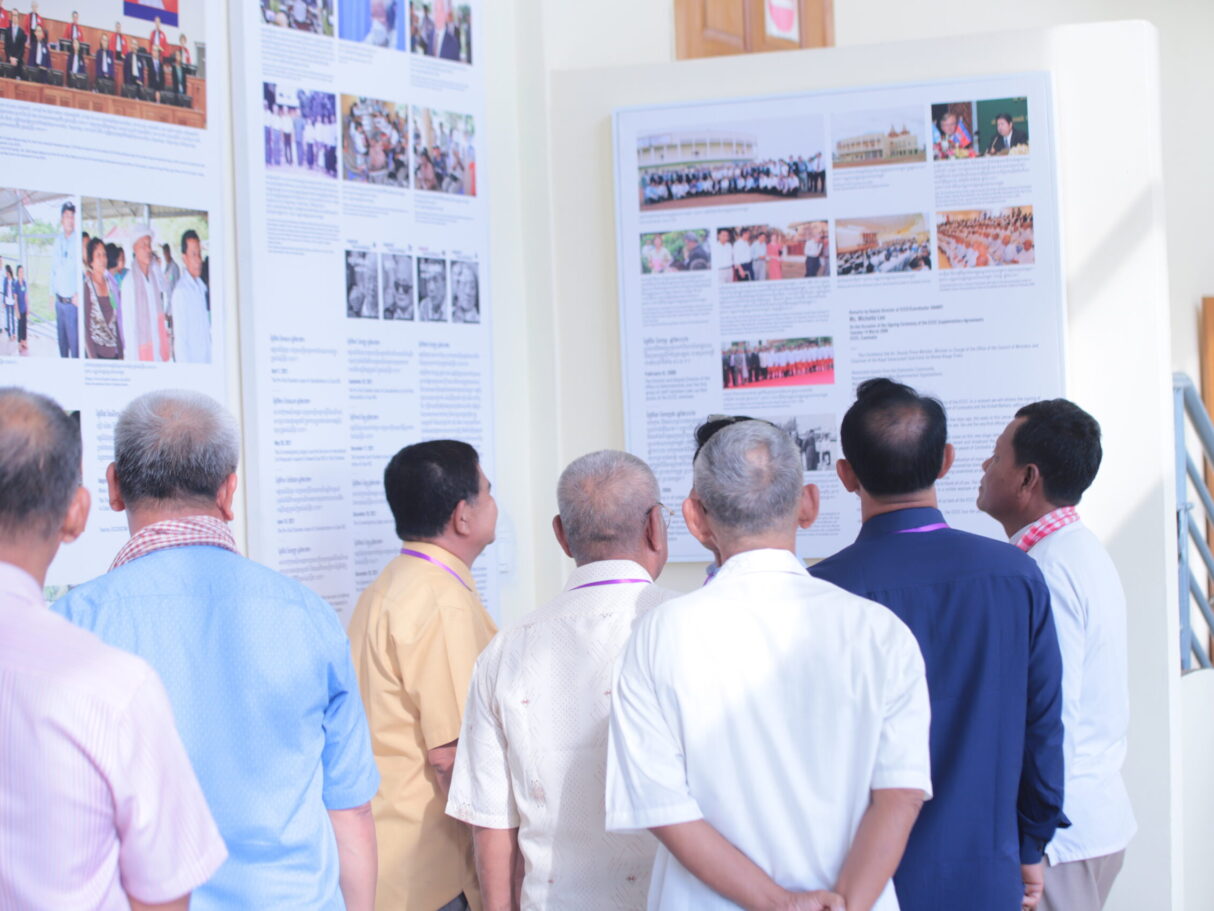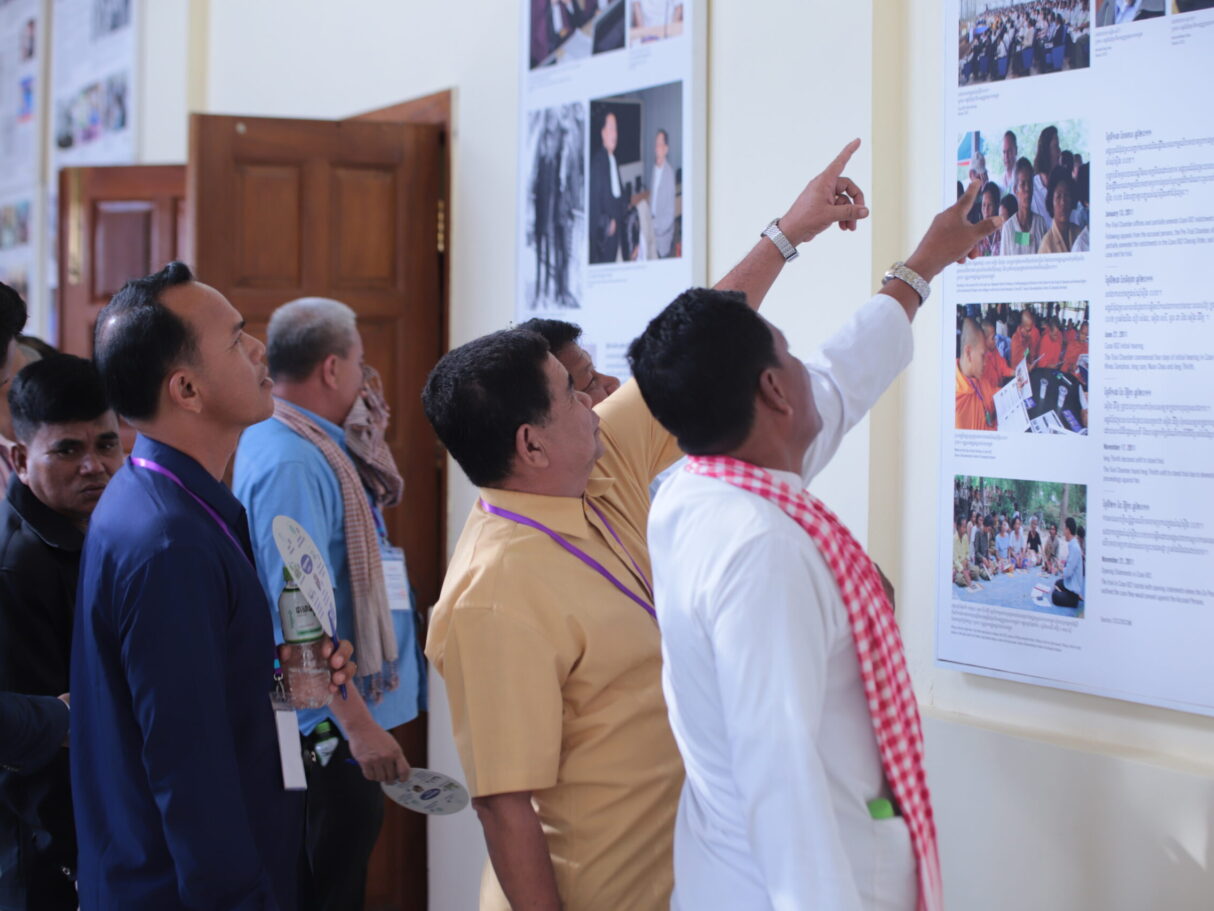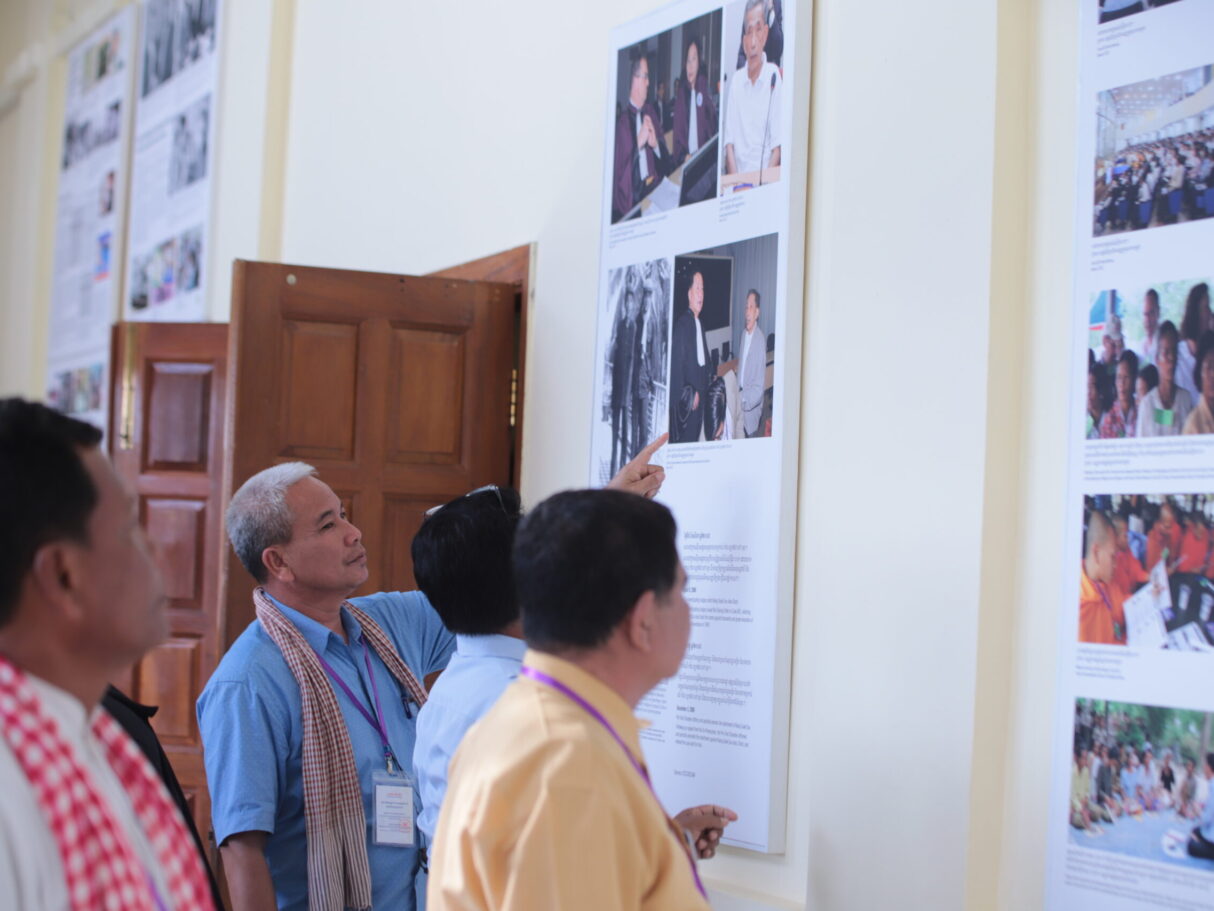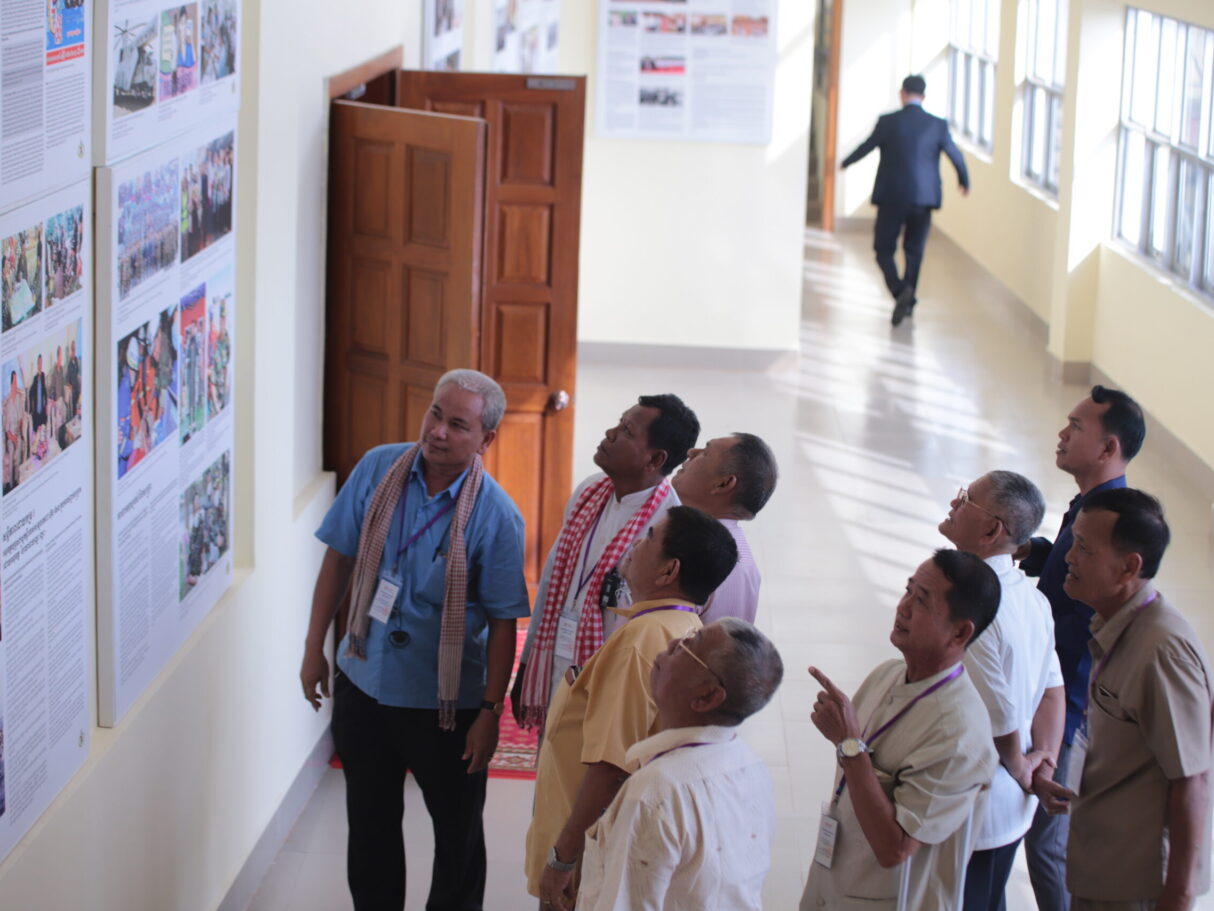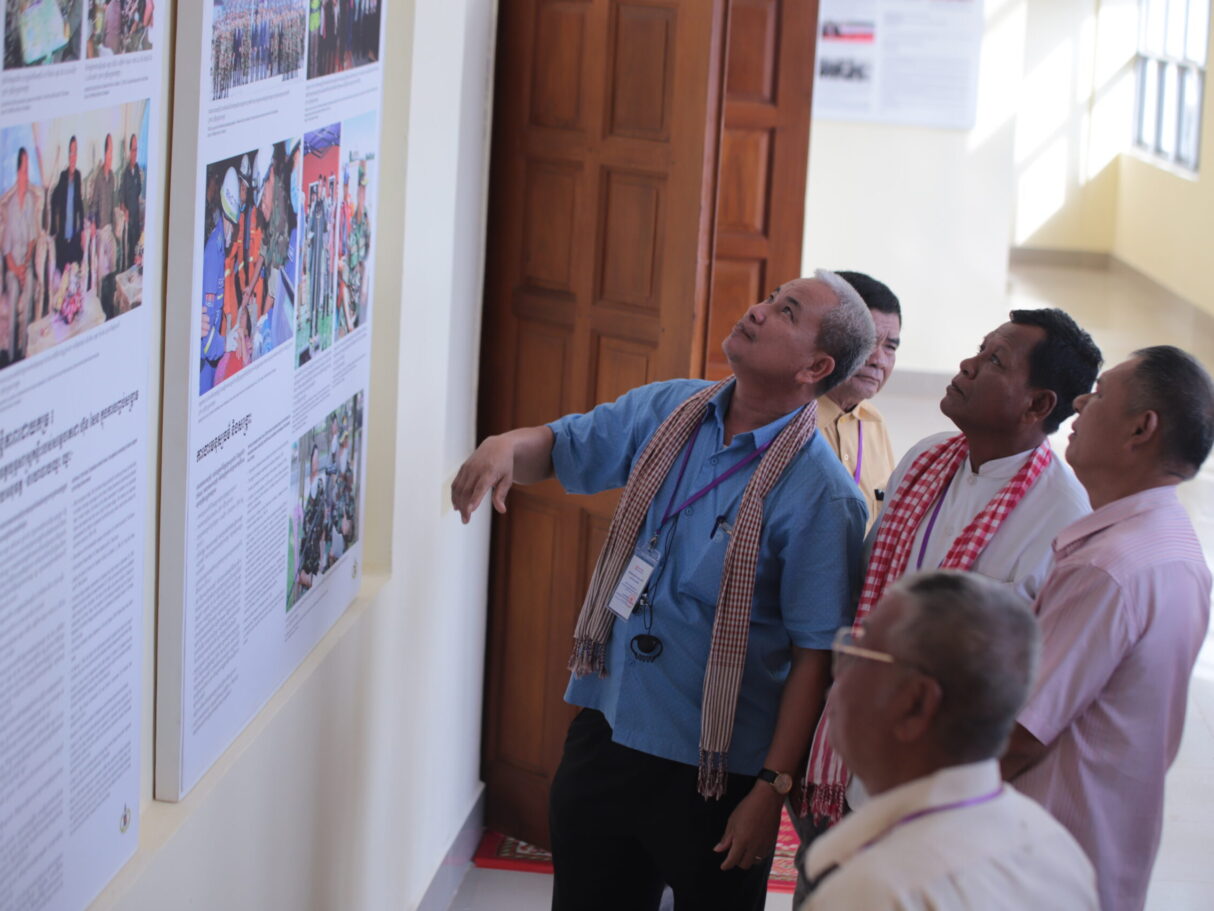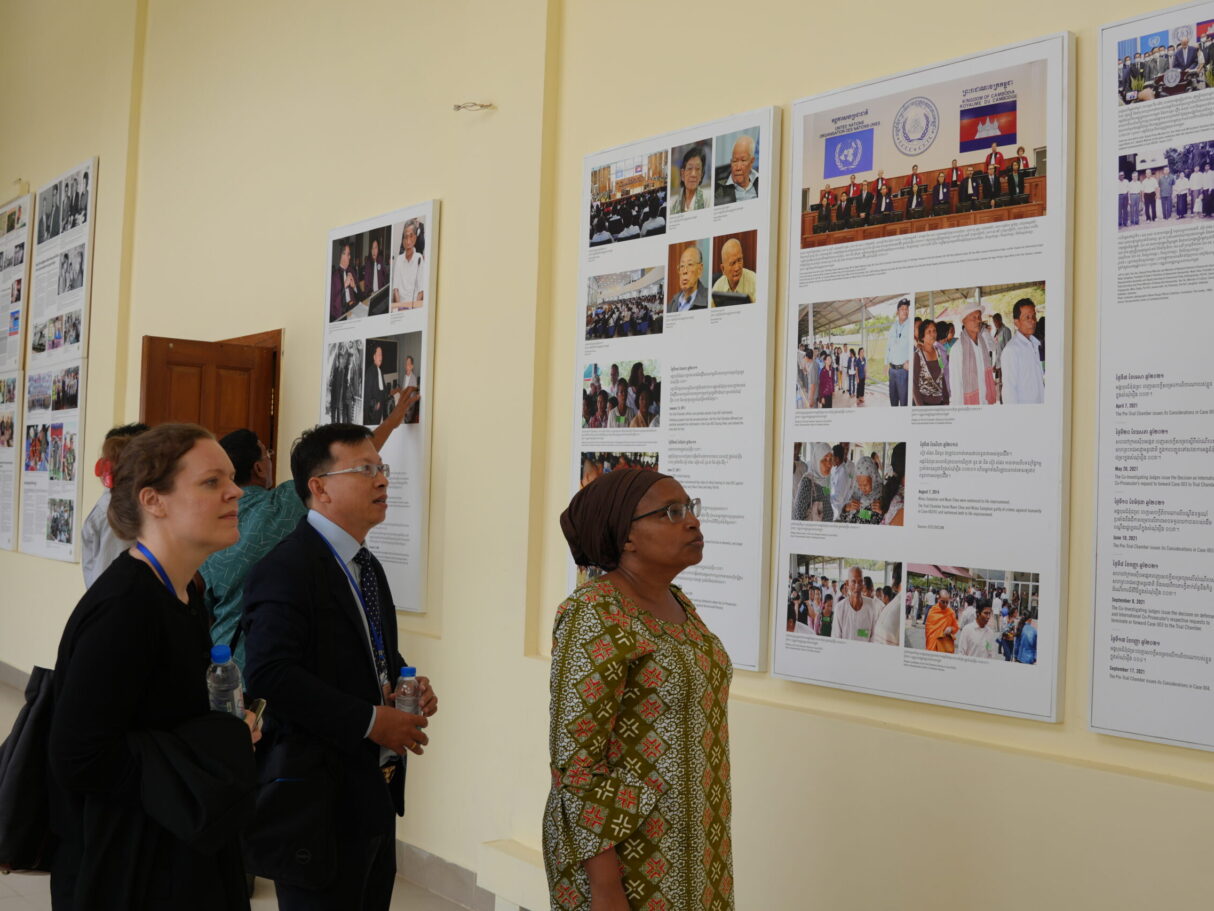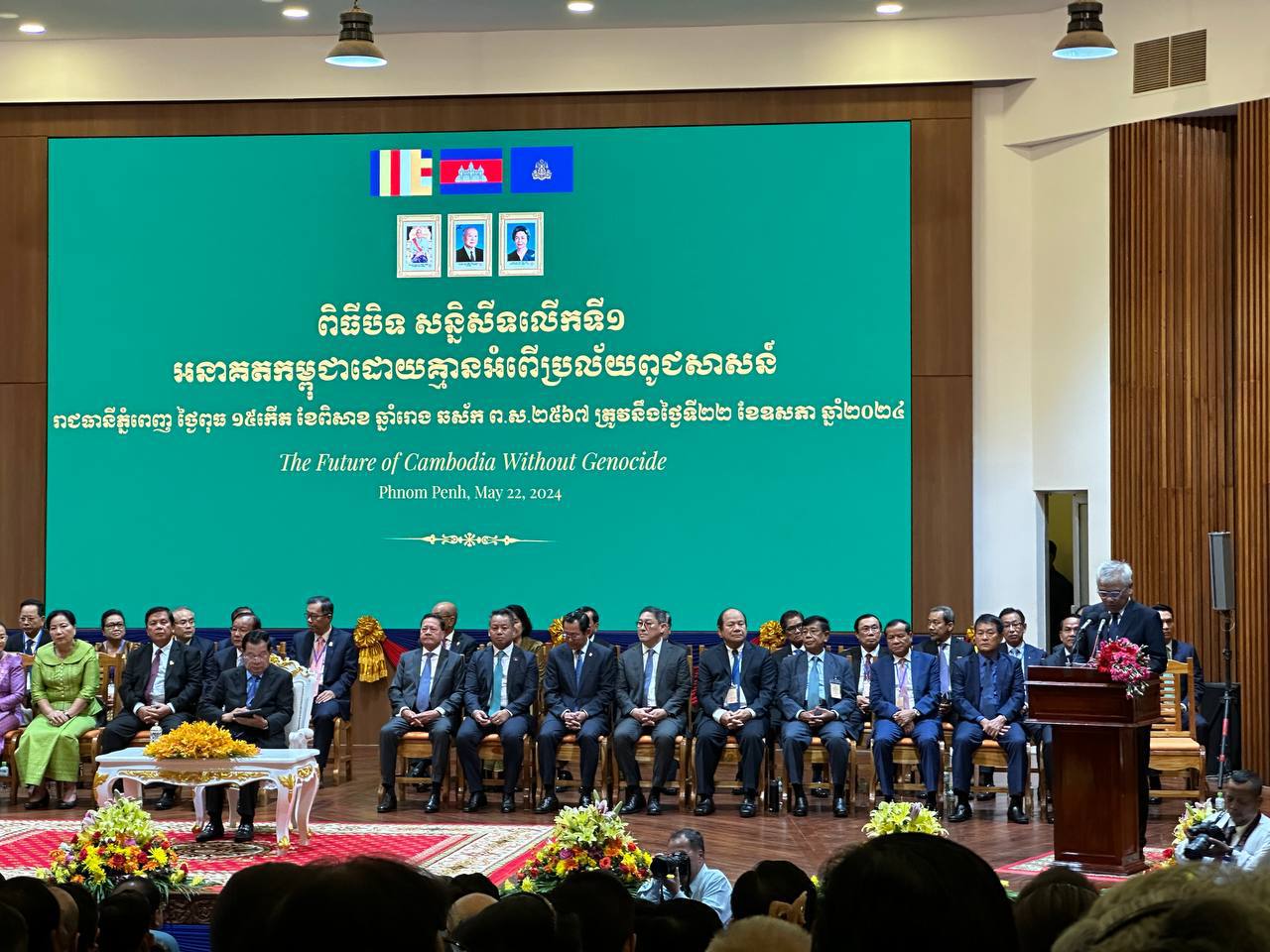Samdech Moha Bovor Thipadei Dr. Hun Manet
Prime Minister of Cambodia
Photo in 2019 by H.E. Dr. Mao Havanall, Minister in charge of the State Secretariat for Civil Aviation. During a meeting with Documentation Center of Cambodia Executive Director Youk Chhang, Dr. Hun Manet reviewed the monograph, entitled “Mass Atrocities in World History for High School Students in Cambodia” and the “Master Plan for of the Construction of The Queen Mother Library, as envisioned by late, legendary, and world class award-winning architect, Zaha Hadid.“
“All government institutions, both military and civilian, must support the work of genocide education for future generations. We must ensure that history teaching is properly integrated into the public and private school curricula from secondary education to the university level, and all of our teachers can join forces to promote genocide education in schools across the country. Genocide education does not have to be limited to history lessons. We can integrate it into all subjects, from Khmer morality and literature to leadership studies and other soft skills development. We can also develop creative ways to tell these difficult stories to people of different ages and generations through arts, digital content, or multimedia.”
“We need to emphasize that the obligation to promote genocide education is the responsibility of all, not just the government. Today’s conference is a great example of good cooperation and solidarity between the various stakeholders. I would like to thank the Documentation Center of Cambodia (DC-Cam) for assisting the Royal Government in integrating the teaching of the history of genocide into professional and institutional development and in disseminating activities in national and international society, using history to reflect and inspire the future of Cambodia.”
Remarks by Samdech Moha Borvor Thipadei Hun Manet, Prime Minister of the Kingdom of Cambodia at the Opening Ceremony of the First Conference on “The Future of Cambodia Without Genocide” Held from 20 to 22 May 2024 at ‘The Yutti Techo Hall’ of the Royal Cambodian Armed Forces (H.Q.).
Prevention and Response Through Education and Health Care
20-22 May 2024
The Yutti Techo Hall, Army Headquarters of the Royal Cambodian Armed Forces
(Former Courtroom Hall of the Extraordinary Chambers in the Courts of Cambodia)
Address: National Road 4, Ang Village, Sangkat Kantork, Kambol District,
Phnom Penh, Kingdom of Cambodia
Language: Khmer/English simultaneous translation
Organized by the Office of Samdech Moha Bovor Thipadei Dr. Hun Manet, Prime Minister of Cambodia, Kingdom of Cambodia,
the Documentation Center of Cambodia, and Temple University’s Beasley School of Law, USA
Supported by the Royal Cambodian Armed Forces of the Ministry of National Defence
Generously sponsored by the United States Agency for International Development
Disclaimer: This conference and website were funded in part by the United States Agency for International Development (USAID) and the Royal Cambodian Armed Forces of the Cambodian Ministry of National Defence. The opinions, findings and conclusions stated herein are those of the Documentation Center of Cambodia (DC-Cam) and do not necessarily reflect those of the United States Agency for International Development and the Royal Cambodian Armed Forces of the Ministry of National Defence.
The Concept & Objectives
Background
Nearly fifty years ago, on April 17, 1975, the Khmer Rouge took power in Cambodia. The regime maintained political control through brutal violence, seeking to destroy in particular ethnic and religious minorities, Buddhist monks, and intellectuals. The impact on Cambodian society was devastating: An estimated one-third of the Cambodian population was murdered by or starved to death under the Khmer Rouge regime. Even after the regime collapsed, internal conflict and international isolation followed, and in their wake came famine, political instability, and overwhelming human suffering for nearly forty years.
An estimated five million Cambodians survived the Khmer Rouge regime. Research on trauma-induced mental health challenges in post-conflict societies, including surveys specific to Cambodia, have found substantially increased levels of mental and physical health conditions resulting from the trauma suffered by survivors. In order to understand these challenges more fully, the Documentation Center of Cambodia (DC-Cam) has collected information from over 31,000 Khmer Rouge survivors, identifying conditions such as high blood pressure, heart disease, gastrointestinal disorders, and mental illness that have resulted at least in part from the trauma of the Khmer Rouge regime and its aftermath. Strikingly, nearly 90 percent of those surveyed continued to experience upsetting memories of the Khmer Rouge era and a quarter still suffered nightmares from their experiences over four decades ago.
This research points to a finding that is crucial to Cambodia’s future: the trauma from the Khmer Rouge era and its health sequelae continue to impact many Cambodians, from those who survived the regime to their children, grandchildren, and broader communities. Untreated trauma from these unspeakable harms can be at the root of harmful behavioral patterns such as substance abuse and even domestic violence. The challenges of processing the trauma and related emotions from the era can impact the nation both individually and through its institutions.
In Cambodia, landmines endure as a physical reminder of its conflict-laden history. Thousands of Cambodians have been killed or injured simply because they stepped in the wrong place while walking through the countryside, unaware of the explosive harms that lay hidden just beneath the surface. While less immediately visible, the mental health consequences of Cambodia’s history, if left untreated, risk similar consequences. Cambodia’s mental health legacy can negatively impact individual identities, family and community relationships, and belief systems through harmful behaviors and actions. These harms in turn can impact societal perceptions of government services, norms, and laws. In other words, decisions about whether and how to address the mental and physical health challenges resulting from the Khmer Rouge era will impact the future of Cambodians as individuals and Cambodia as a society.
The conference will foreground the roles of atrocity crimes education and mental and physical health care in preventing and responding to genocide. Education about the perpetration of atrocity crimes is crucial in ensuring that individuals and societies understand their own past. This knowledge, combined with an understanding of the ongoing impacts of these crimes, is a vital first step in building the thoughtfulness and diligence necessary to dismantle conditions that might catalyze future harms. Successful education around atrocity crimes requires dedicated and substantial commitment from governments and civil society actors.
Objectives
The conference organizers aim to establish a transnational community of experts in human rights and genocide prevention in post-conflict societies who can share innovative ideas and best practices, working together to build an enduring peace in Cambodia and beyond. This will be the first in a series of conferences that will lay the foundations for that network.
In terms of policy goals (prevention and response), this conference will seek to develop campaigns to ensure that governments throughout the world integrate atrocity crimes education into mandatory high school curricula at the national level. Participants will also discuss collaborative approaches to obtain pledges from military forces around the world that they will include atrocity crimes education as a mandatory component of professional miliary education of officers and senior leaders. Most importantly, the conference will devise strategies to incorporate atrocity crimes education into all international development policy by conditioning development aid on the implementation of a credible atrocity crimes education curriculum.
President of Senate of the Kingdom of Cambodia and President of Supreme Privy Council to His Majesty King Norodom Sihamoni
“The Yutti Techo Hall is an important historical site for memorializing the stories and the struggles of Cambodians in confronting their difficult past. This memorial was conceived through the pursuit of justice for the victims and the survivors of the Khmer Rouge genocide, with support from the United Nations and the international community. The Hall is best suited for Cambodians from all walks of life and the international community to organize events and to learn about Cambodia’s history and efforts in preventing genocide from reoccurrence.”
Concluding Remarks by Samdech Techo Hun Sen, President of Senate of the Kingdom of Cambodia and President of Supreme Privy Council to His Majesty King Norodom Sihamoni at the First Conference on “The Future of Cambodia Without Genocide” Held from 20 to 22 May 2024 at ‘The Yutti Techo Hall’ of the Royal Cambodian Armed Forces (H.Q.).
Day 1: Monday, 20 May 2024
- Welcome Remarks by Mr. Youk Chhang, Director of Documentation Center of Cambodia
- Keynote Speech and Opening by Samdech Moha Bovorthipdei Dr. Hun Manet, Prime Minister of the Kingdom of Cambodia
- Keynote Address by Special Advisor to the United Nations Secretary-General of the Prevention of Genocide, Ms. Alice Wairimu Nderitu
- Keynote Address by Her Excellency Dr. Beth Van Schaack, the United States Ambassador-at-Large for Global Criminal Justice
- Panel 1: Genocide, The United Nations Genocide Convention, Atrocity Crimes
- Panel 2: Justice, The Extraordinary Chambers in the Court of Cambodia
- Panel 3: Youth and Education, The Role of Education in Prevention and Response Strategies to Atrocity Crimes and the CamboCorps as a Cambodian Use Case
Day 2: Tuesday, 21 May 2024
- Panel 4: Health, Health & Human Rights, and Genocide Prevention in Post Conflict Societies
- Focus Group: Oral History, Justice, Genocide Education, Health (Mental & Physical)
- A film screening, “Don’t Think I’ve Forgotten, Cambodia’s Lost Rock & Roll” at Yutti Techo Hall
Day 3: Wednesday, 22 May 2024
- Report by Mr. Youk Chhang, Director of Documentation Center of Cambodia
- Concluding Remarks by Samdech Techo Hun Sen, President of Senate of the Kingdom of Cambodia and President of Supreme Privy Council to His Majesty King Norodom Sihamoni
Keynote Speakers:
AN EXHIBITION
On Trial: 16 Years of the ECCC Process
Senior Legal Advisor to the Documentation Center of Cambodia
Dean of the Hamilton Lugar School of Global and International Studies, Indiana University (USA)
In the decades after the demise of the Khmer Rouge regime, Cambodia suffered from almost unfettered impunity. The architects of some of history’s most notorious mass crimes went free, unchallenged by a credible legal process. Survivors bore their pain with little prospect of justice. Their hopes rose with the 2004 establishment of the Extraordinary Chambers in the Courts of Cambodia (ECCC), a tribunal organized and staffed by the Cambodian government and United Nations. The ECCC was created to deliver justice from some of the most notorious Khmer Rouge atrocities, including genocide, war crimes, and crimes against humanity. Cambodian survivors overwhelmingly welcomed the tribunal as an opportunity to advance truth, justice, and reconciliation.
The ECCC process unfolded over several years. Cambodian and international prosecutors, investigators, judges, lawyers, and staff devised a complex set of rules and procedures to govern the complex “hybrid” court. Investigators then set out to probe some of the many crimes of the Khmer Rouge regime. Its first case focused on atrocities at the infamous S-21 security center at Tuol Sleng, led by Kaing Guek Eav, better known as Duch. His lengthy trial featured a great deal of documentary and forensic evidence, as well as testimony by expert witnesses and a number of courageous Cambodian survivors. In 2010, the ECCC convicted Duch for crimes against humanity, murder, and torture—the first credible judgment in more than 30 years for the atrocities of Democratic Kampuchea (DK).
The ECCC’s second case focused on an array of crimes orchestrated around the country by senior Khmer Rouge leaders. The first trial in that case was a complex affair, including multiple charged persons, an expansive investigation, and the involvement of thousands of “civil parties”—survivors represented beside the prosecution as part of the ECCC’s groundbreaking scheme for victim participation. Two of the four charged persons did not face judgment. Former Khmer rouge minister of social affairs Ieng Thirith was found unfit to stand trial due to dementia, and her husband, former Khmer Rouge foreign minister Ieng Sary, passed away during the lengthy trial. The two remaining defendants, senior Khmer Rouge figures Nuon Chea and Khieu Samphan, were convicted of crimes against humanity in 2014. In a second trial, both men were found guilty of genocide, war crimes, and crimes against humanity by the trial chamber, though only Khieu Samphan survived to see his convictions upheld on appeal.
For survivors, the ECCC proceedings brought mixed reactions. Many appreciated and benefitted from the opportunity to join as civil parties and otherwise to participate by sharing their stories. Many also witnessed portions of the process directly in the ECCC’s large gallery, and others engaged in the process through regular outreach events organized by the tribunal and its NGO partners. Many welcomed the taste of justice when the court pronounced its verdicts and appreciated the collective and moral reparations it awarded in collaboration with civil society organizations. However, the length, complexity, and limited legal focus of the proceedings also left some survivors disappointed. Many survivors passed away before seeing any senior Khmer Rouge officials brought to justice. Others lamented the small number of persons charged and wished for a process that would focus more on the crimes they experienced and witnessed every day. Some saw the tribunal as a political affair. Even those most supportive of the ECCC process saw it as just one aspect of a broader quest.
This exhibition includes 16 panels, each representing one year of the ECCC proceedings. The panels highlight key successes and shortcomings of the process. They chronicle the tribunal’s unprecedented judicial investigations into crimes of Democratic Kampuchea, its indictments of senior Khmer Rouge figures, its contentious trials, and its watershed verdicts. The exhibition also shows the ECCC’s limits, such as its narrow jurisdiction and the constraints on its innovative scheme for victim participation. The panels convey the tribunal’s tribulations as well, including legal controversies, administrative challenges, and politicized feuds over further prosecutions. Overall, it shows the ECCC process to be a crucial step in genocide justice for Cambodian survivors but a limited, imperfect one. This chronology of the ECCC’s experience thus points toward the continued need to invest in historical memory and justice in Cambodia.
The First Conference
The Future of Cambodia Without Genocide:
Prevention and Response Through Education and Health Care
20-22 May 2024
The Yutti Techo Hall, Headquarters of the Royal Cambodian Armed Forces
(Former Courtroom Hall of the Extraordinary Chambers in the Courts of Cambodia) National Road 4, Ang Village, Sangkat Kantork, Kambol District,
Phnom Penh, Kingdom of Cambodia
Facebook YouTube Website TikTok Khmer Times The Diplomat Report Cambodge Mag. Camboja News FORSEA Thomas LaPointe
The Conference logo is inspired by a memorial in Borei O’ Svay Sen Chey district, Stung Treng province that is dedicated to His Majesty, the late King Father Norodom Sihanouk. The memorial honors the late King Father’s commitment to the defense of the border land in Stung Treng province and His Majesty’s contributions to the Nation. The memorial is located near the Cambodian-Laotian border, and it was erected during the time of the King Father’s Sangkum Reastr Niyum administration. When the King Father built this stupa in the 1960s, he dispatched 150 soldier families to live in the area as an advance echelon force to defend Cambodia’s territorial sovereignty. These families, including some of the original soldiers, still reside in the area even today, demonstrating not only their commitment to the region but also an example of enduring success to protect Cambodian territorial sovereignty in this area.
Conference logo was designed by
© Tith Satchavong & Hou Lyza, 2024
Website concept & designed by
Youk Chhang & Panharith Ean, 2024

